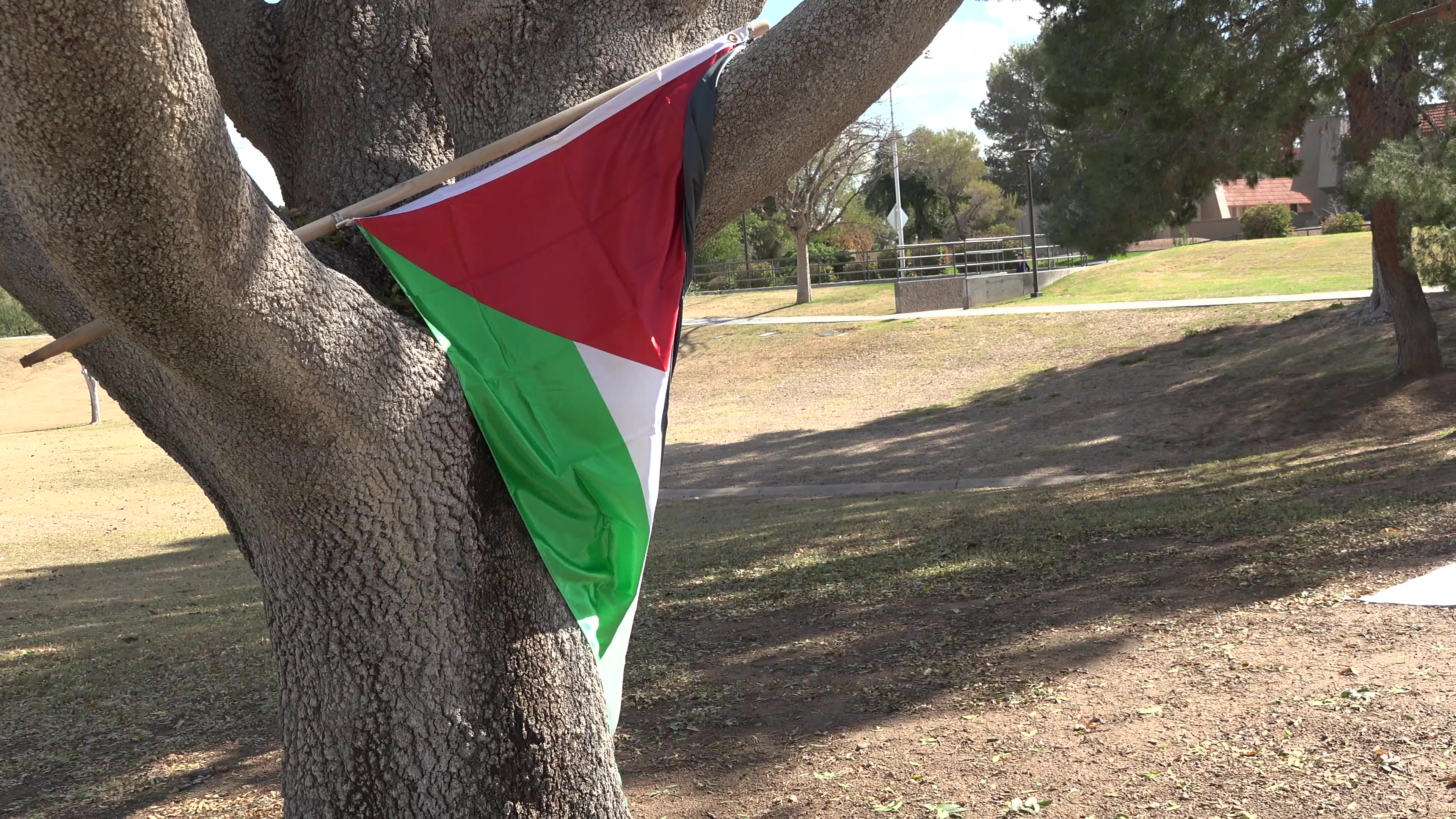Phoenix’s Fight for Palestine
The stand for liberation 1,000 miles away
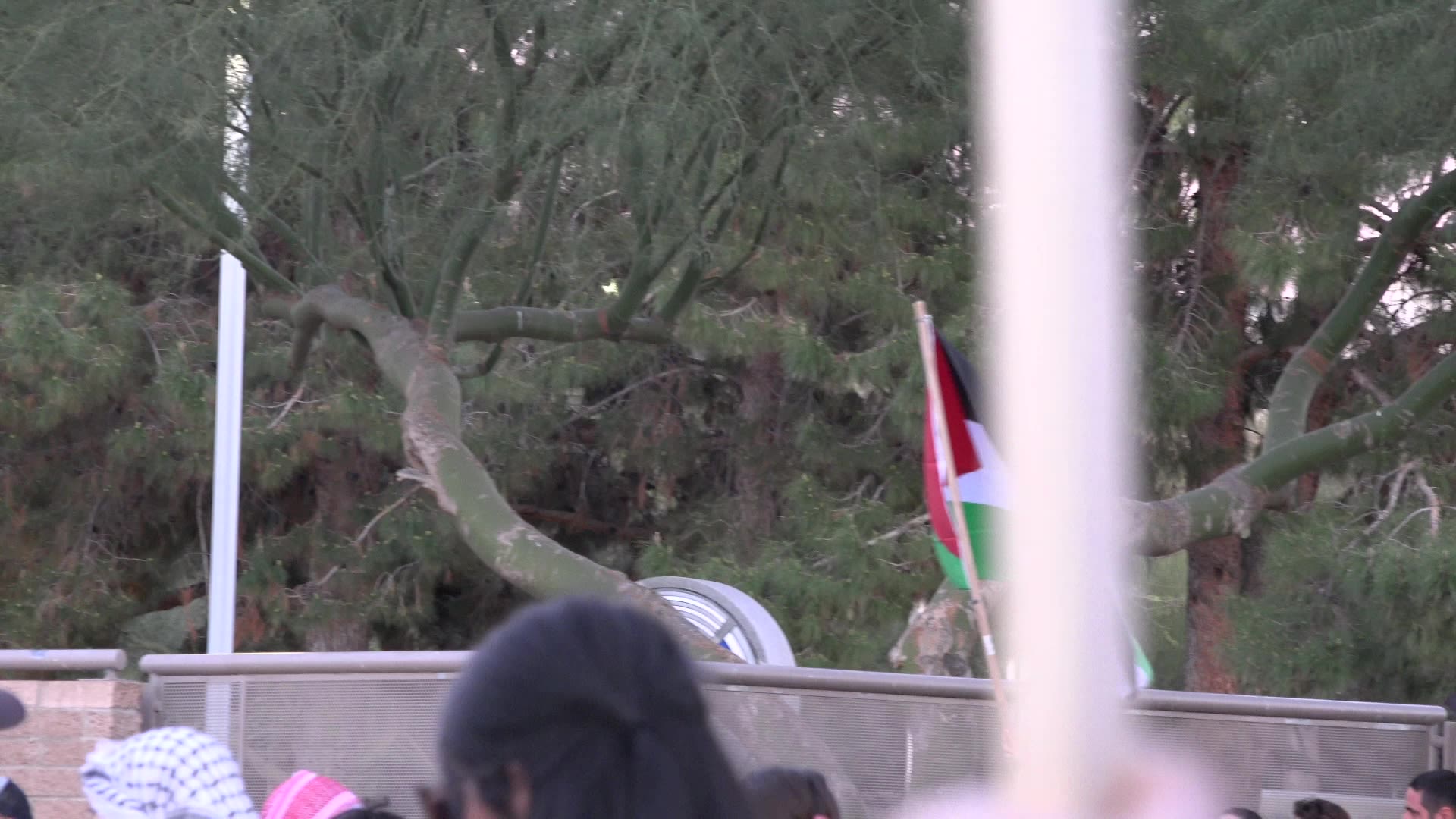
Dystopian novels have been popular literature for decades, often featuring a tyrannical government and the people they oppress fighting for freedom. Those in power control resources, use violent tactics to suppress acts of defiance and reduce the lives of those below them to survival.
Though many of these stories end with the oppressed triumphing and readers closing the book on a happy ending, the life described above is the reality for millions of Palestinians every day whose homeland has been under Israeli occupation for 75 years.
Oct. 7 marked the start of the war on Gaza, in which Israel has been implementing collective punishment on the 2.5 million inhabitants of the Gaza Strip in response to a Hamas attack. More than 30,000 people have been killed in the past seven months, while those who have survived must endure forced starvation, and severely limited water, necessities, and medical attention.
Though the war on Gaza started on Oct. 7, the violence against the Palestinian people has been happening for decades, which is exactly why millions around the world are advocating for the occupied nation and will not stop until they see a free Palestine.
For live updates on the current war and more information on the history of Palestine, visit here
The Origins of the Occupation
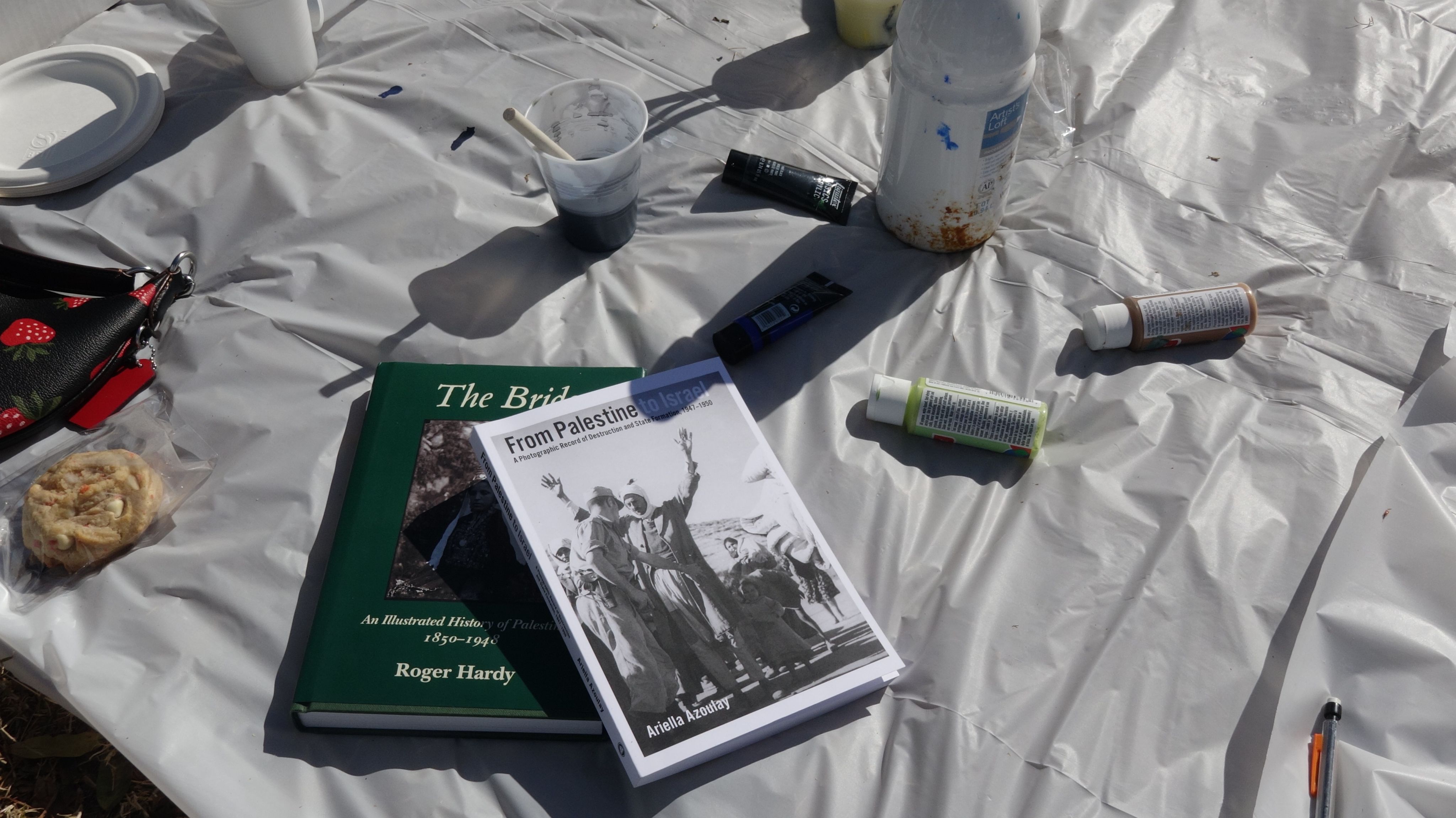
Before the Nakba
Also called ‘the Catastrophe’, 1948 was the year in which Israeli settlers ethnically cleansed 750,000 Palestinians from their land and declared themselves an ethnostate, but not even that was the beginning of this violent conflict.
Backed by Western powers, Israel had the means to take Palestine with little retaliation and no repercussions.
Here is a timeline leading up to the Nakba:
1882: Jews from Eastern Europe began traveling to Palestine due to the rise of the Zionist ideology and anti-Semitic persecution. At the time, there was a Jewish-Palestinian population of 3% with no ties to Zionism known as the Yishuv. Different ethnicities and religions dwelled in several communities across the nation.
1896: Zionism was popularized by a pamphlet called ‘The Jewish State’, written by a journalist named Theodor Herzl.
“We shall have to spirit the penniless population across the border … while denying it any employment in our country.”
1917: The end of the Ottoman Empire, in which the French and the British began dividing up the Middle East for colonial interests. The British took Palestine and declared they would aid in the establishment of the land as a home for Jewish people.
1919: The British began facilitating Jewish immigration to Palestine.
In the next two decades, the Jewish population in Palestine grew from 9% to 27%. This led to the displacement of tens of thousands of Palestinians as Zionists began to buy up land.
1936: The start of a Palestinian-Arab uprising against British support of Zionist settler colonialism. It was dismantled after three years, in which British authorities destroyed 2,000 Palestinian homes and put 9,000 Palestinians into violent concentration camps. There were thousands of deaths on both sides of the conflict.
1944: The British realized the harm they had caused and tried to put limits on Jewish immigration into Palestine. This came at a time when many Jews were fleeing Nazi persecution. Paramilitary Zionist forces began to lobby, and attack both the British and the Palestinians with bombings.
Throughout this time, there was still a steady increase of the Jewish population in Palestine.
1947: The British gave its colonial project in Palestine to the United Nations, unable to handle the mess they had created. The UN decided to split Palestine into two parts: a Jewish ethnostate and an Arab ethnostate.
The Jews were given 55% of the land from the 6% they possessed at the time including the main agricultural lands, seaports, and many of the country’s Arab-majority cities. This led to the rejection of the proposal by Palestinians.
1948: With the exit of the British, the Jewish population began their siege and takeover of Palestine. War broke out between armed, military-trained Zionists and Palestinians. On May 14, Israel declared itself an official state.
Facts of the Nakba:
–At least 750,000 Palestinians were forcefully expelled from their homes by violent militias
–78% of historic Palestine was captured by Zionist forces
–Over 500 villages were ethnically cleansed, destroyed, or both
–Over 70 massacres were committed by Zionists against the Palestinians
–Over 15,000 Palestinians were killed
“Just as the ripples of a stone thrown into a pond will spread further and further away from the source, so the ripples of the disaster in 1948 hit my parents first and then spread to us and to our children long afterwards.”
Funded by Western powers, Israel has enforced their apartheid regime for 75 years. The Palestinian people endure constant violence and discrimination with little to no help from the outside world.
The violence against Palestine is not new, nor is it an isolated incident caused by the Hamas attack. The Palestinians have been fighting for their freedom for a long time, and though it took far too long to hear their cries for help, the world has finally stepped up.
To learn more about the history of Palestine, and see a more detailed timeline of the Nakba and all the lead up to it, visit here.
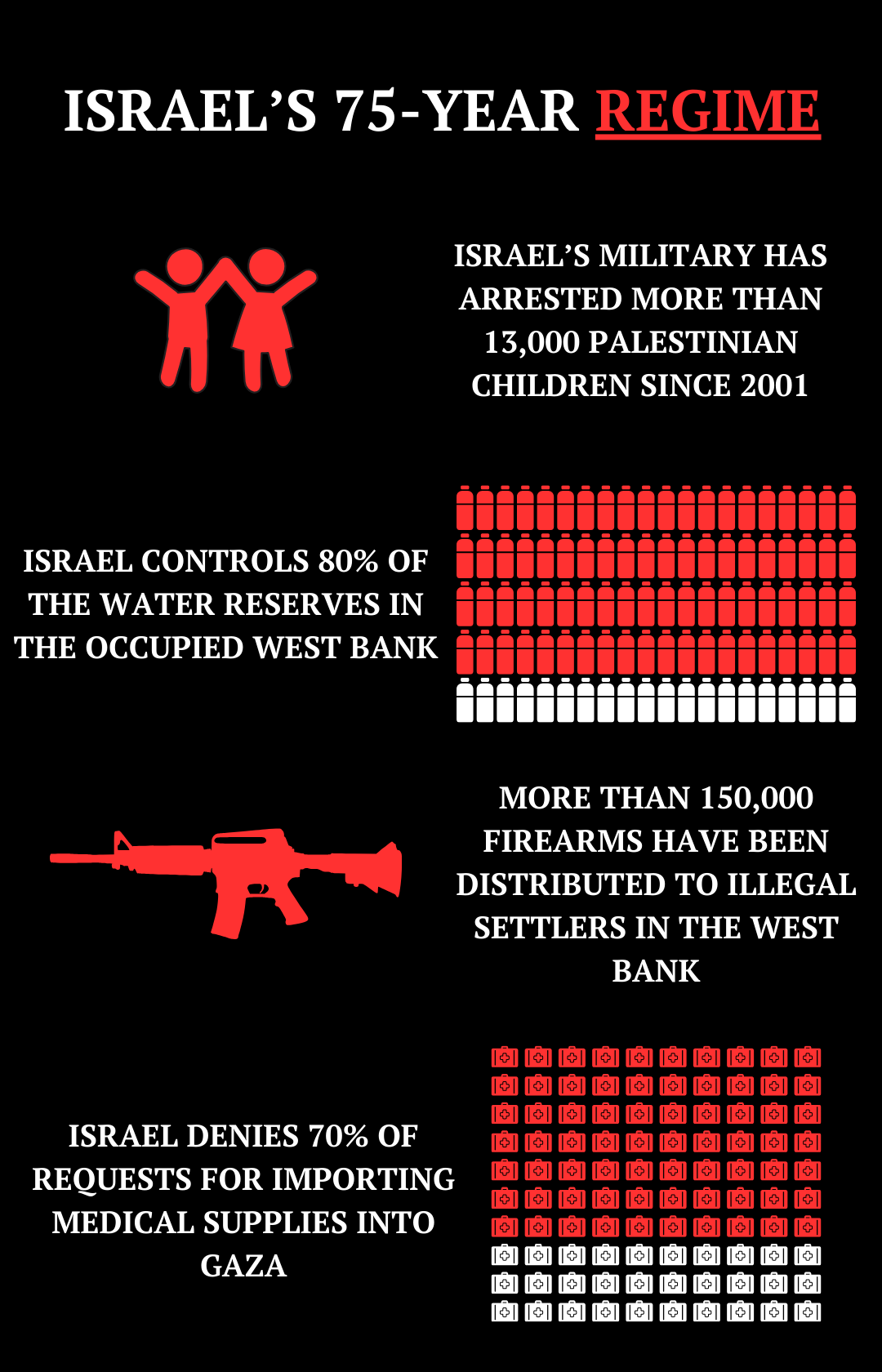
Defense for Children International-Palestine, AP News, NewArab.com, Al Jazeera
Defense for Children International-Palestine, AP News, NewArab.com, Al Jazeera
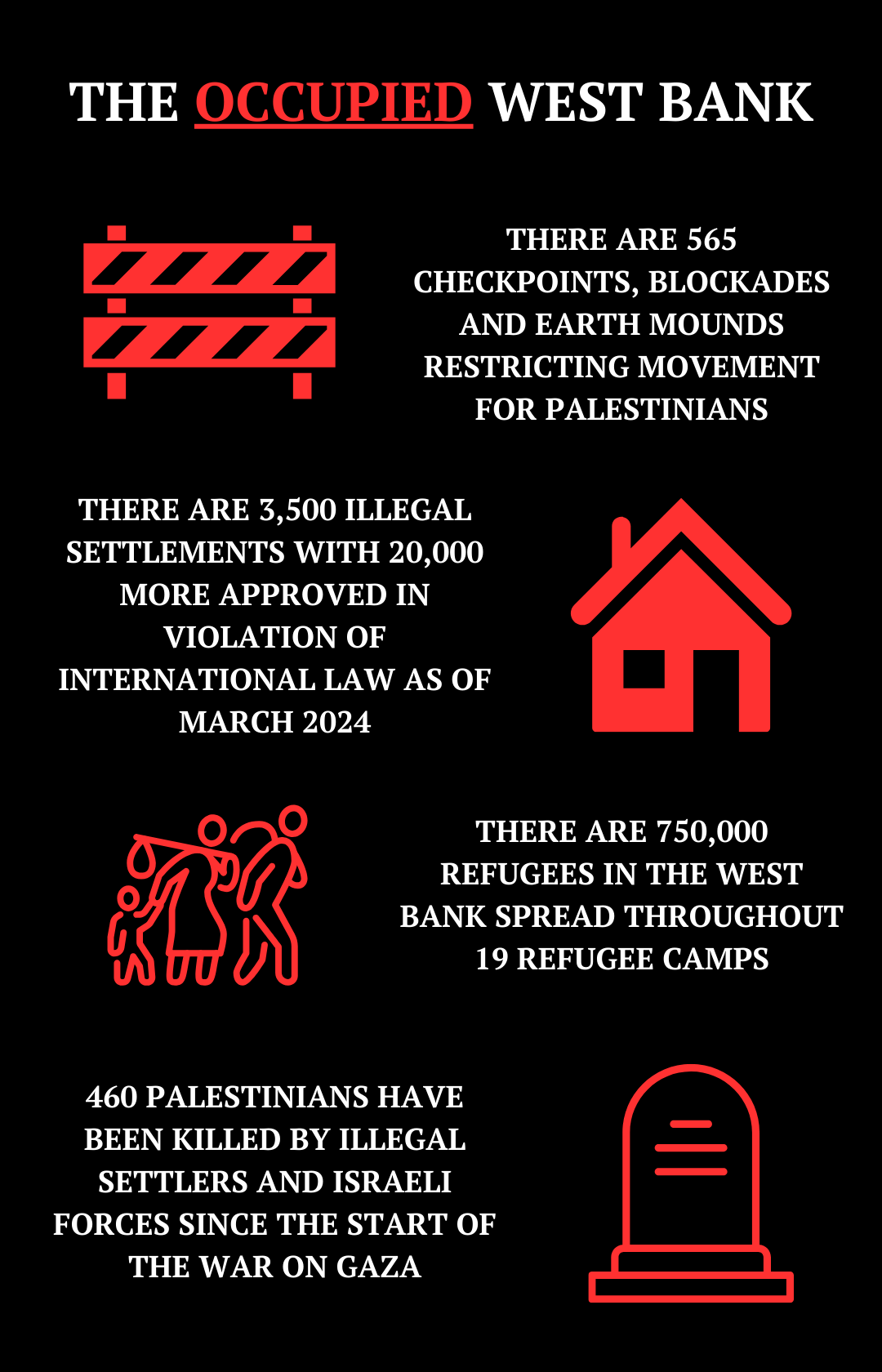
Sources: MachsomWatch.org, Al Jazeera.com, Anera.org, B'tselem.org, PBS.org, unhcr.org
Sources: MachsomWatch.org, Al Jazeera.com, Anera.org, B'tselem.org, PBS.org, unhcr.org
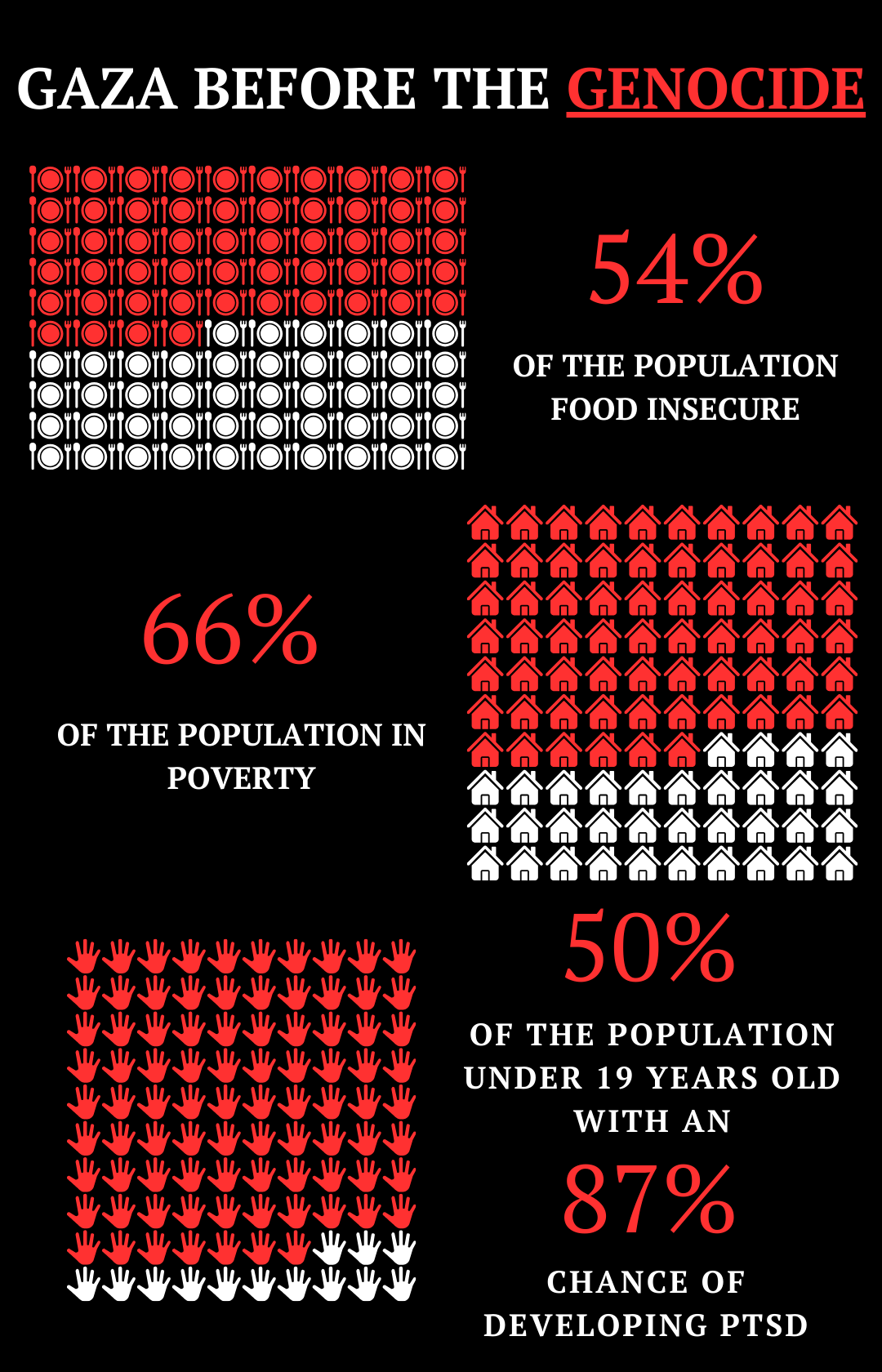
Al Jazeera, NPR.org, ISSblog.nl
Al Jazeera, NPR.org, ISSblog.nl
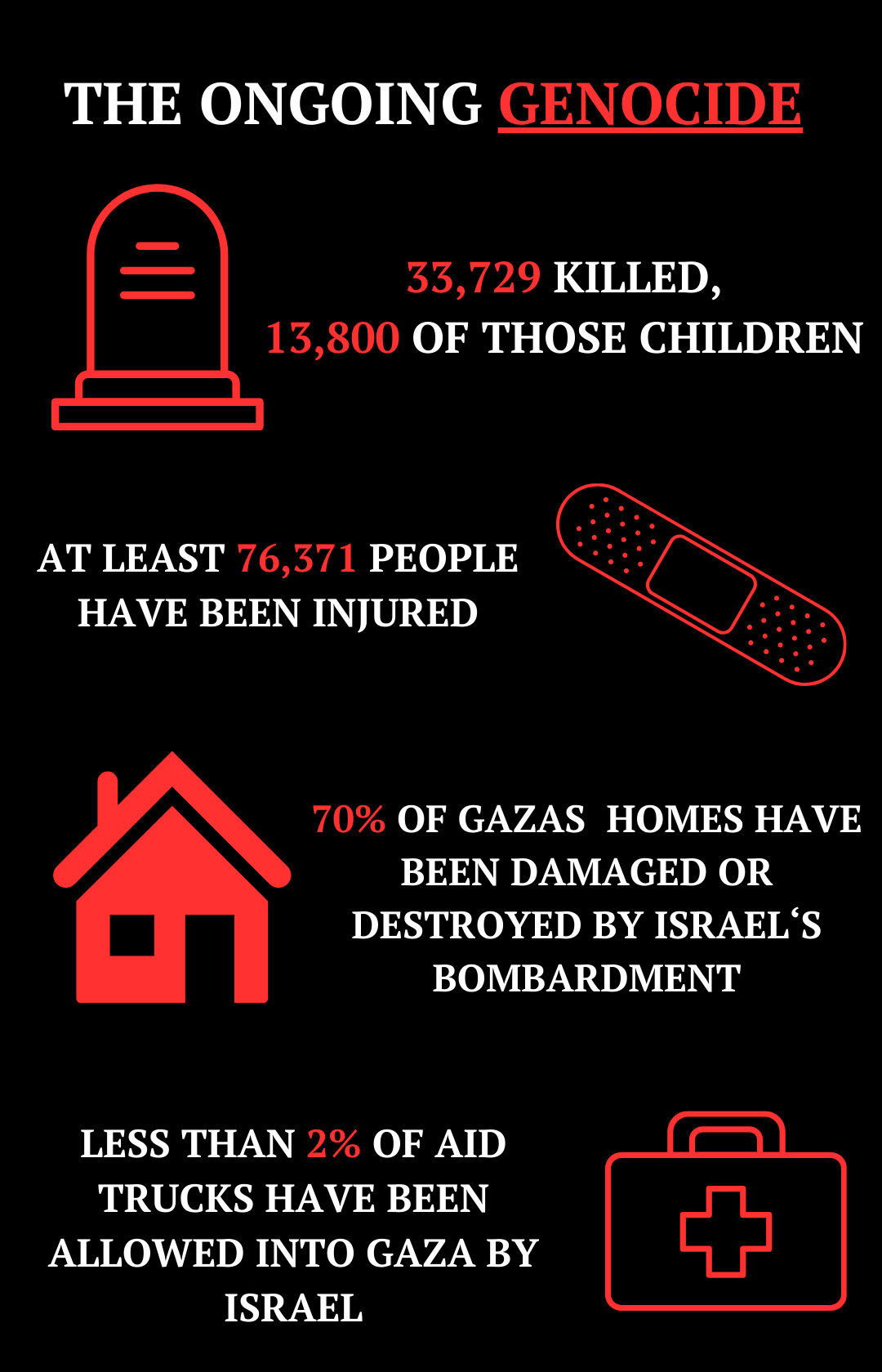
Al Jazeera, the Wall Street Journal
Al Jazeera, the Wall Street Journal
The Fight in Phoenix
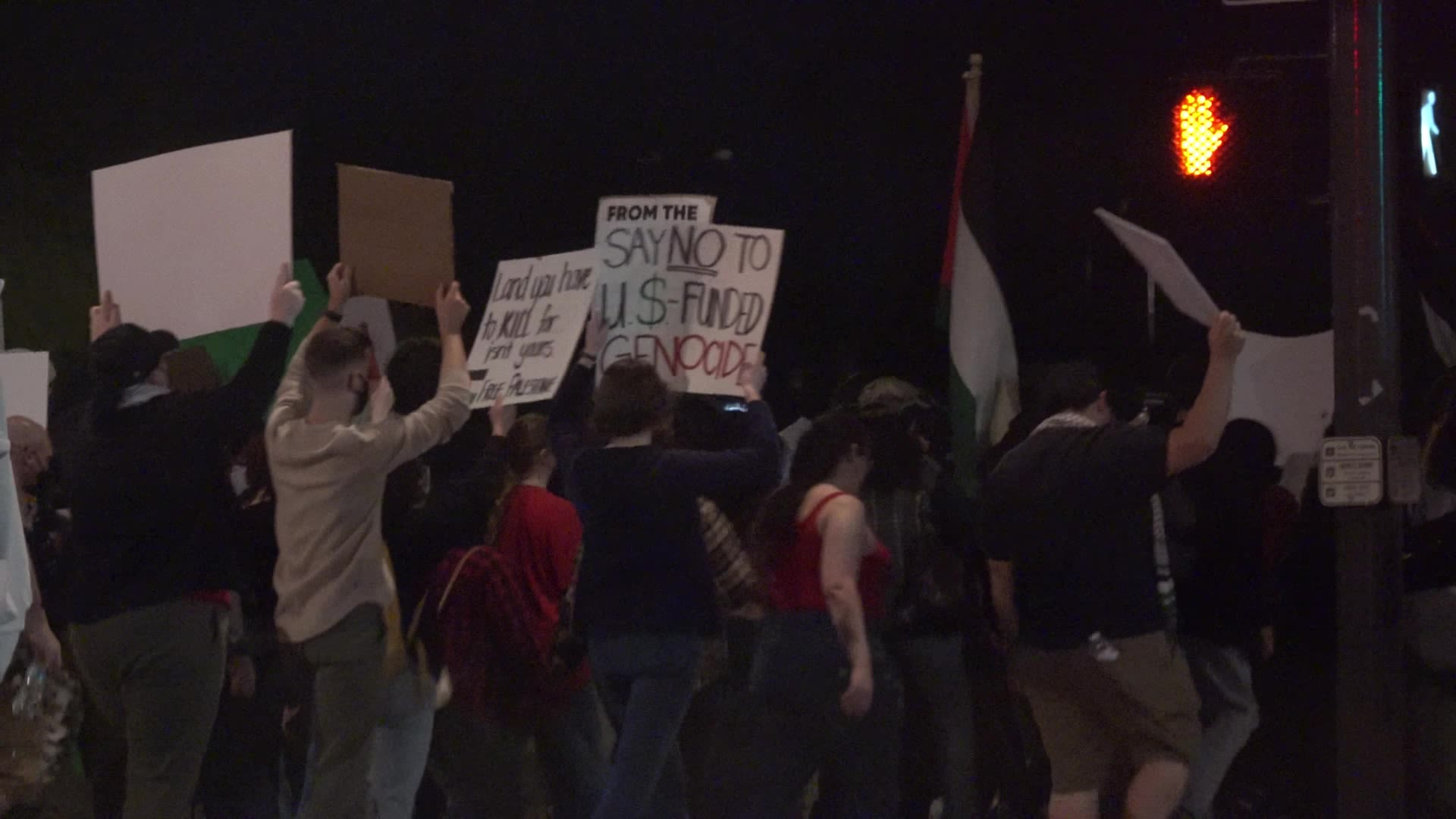
The Skater:
Maen

The past seven months have shown unprecedented support for Palestine. Every day, thousands around the world attend countless events that call for a ceasefire in Gaza and the liberation of the occupied land.
Phoenix is no different, including an event hosted by a community of people that many wouldn’t picture when they think of educational panels: skateboarders.
Most of the room can be identified as such, decked in baggy pants and snapback hats with boards swinging from their hands, but the skating won’t start until later. The annual Slow Impact event is about more than going to the park; it’s meant to build the skate community and learn from the diverse groups within.
Attendees hail from all corners of the country to fill the venue’s seats and listen to the panel of Palestinian skateboarders. Maen Hammad is among them, eager to share not only his own story, but that of the growing skate community in his homeland.
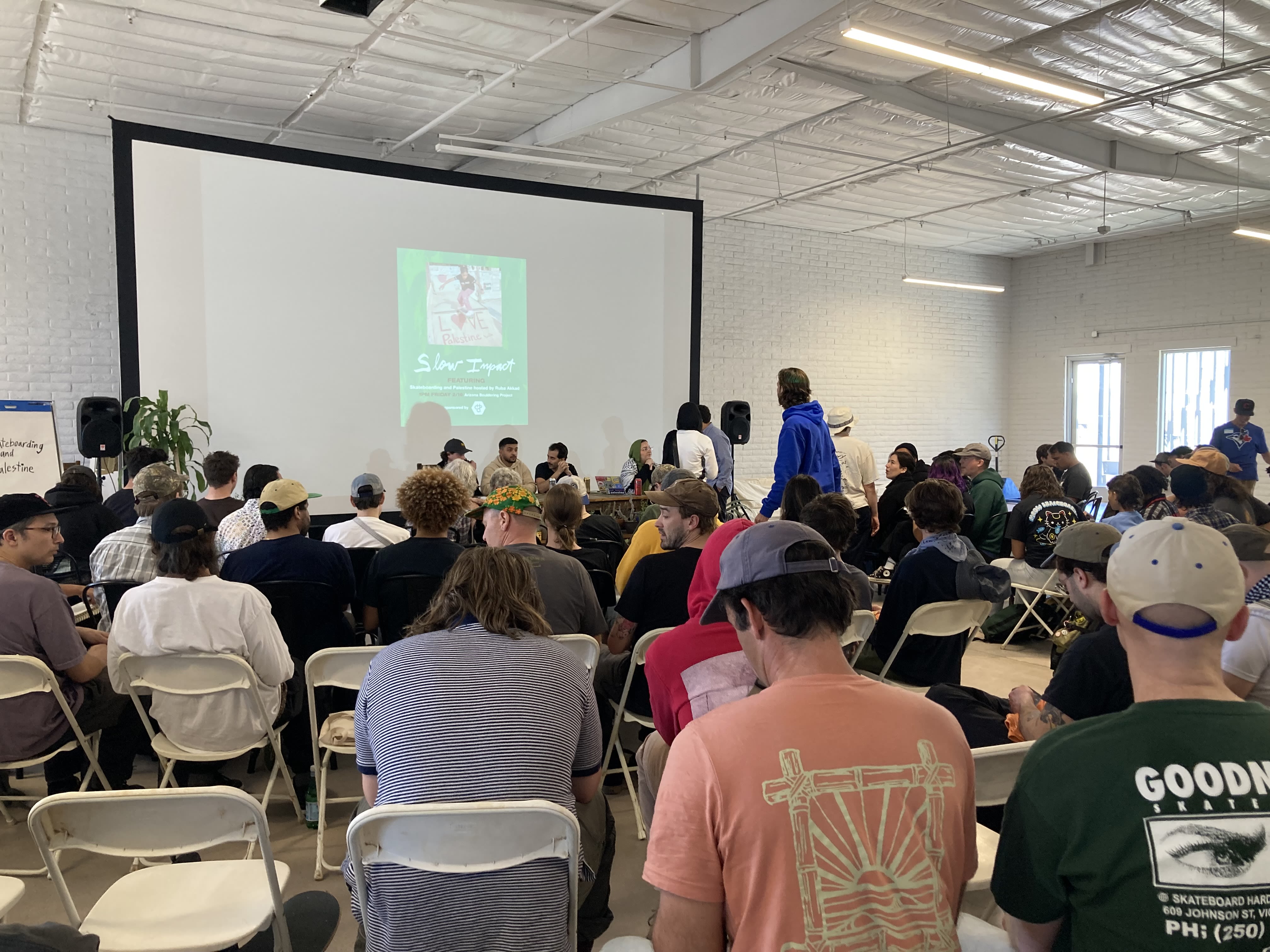
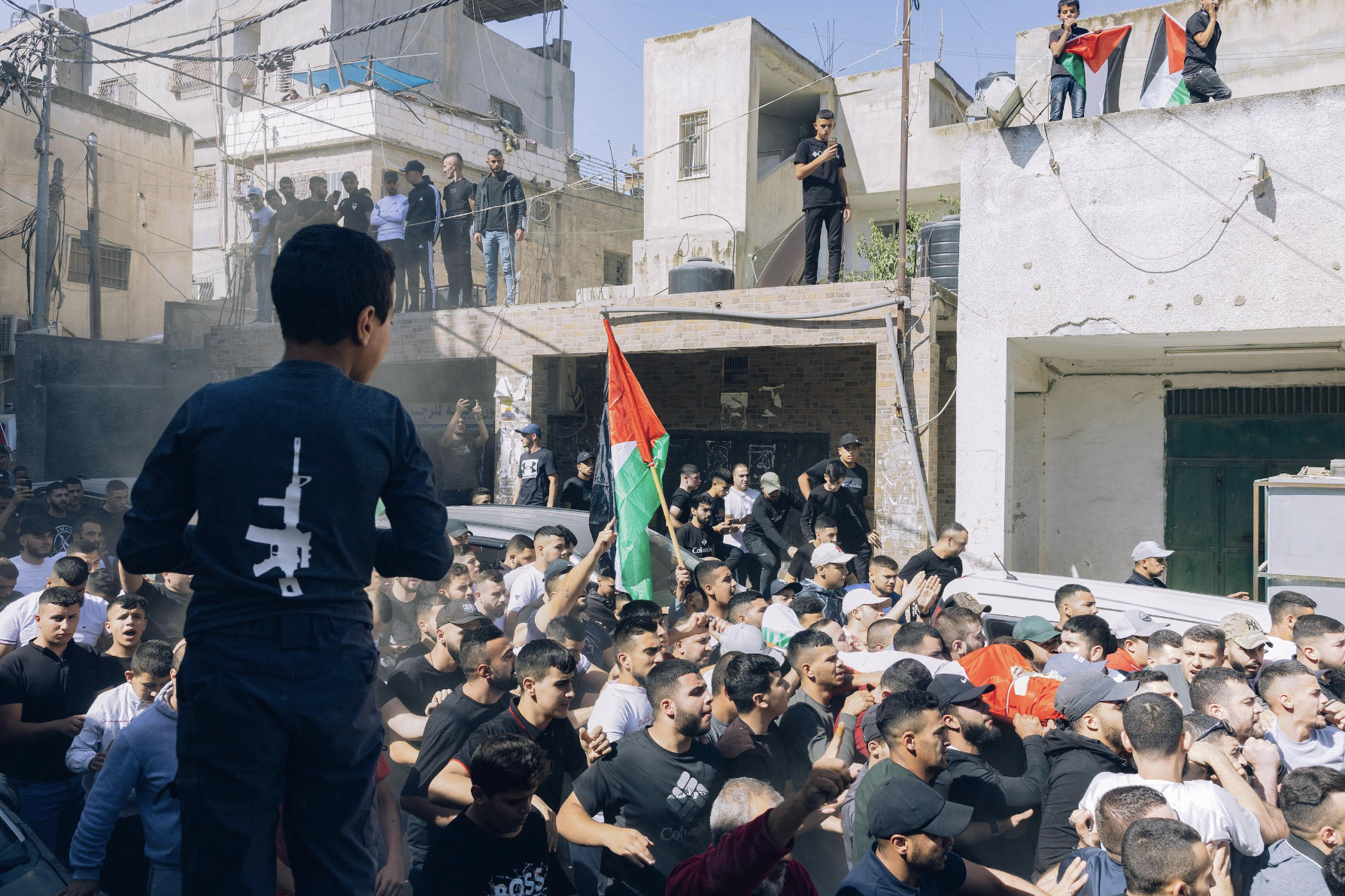
Photo by Maen Hammad
Photo by Maen Hammad
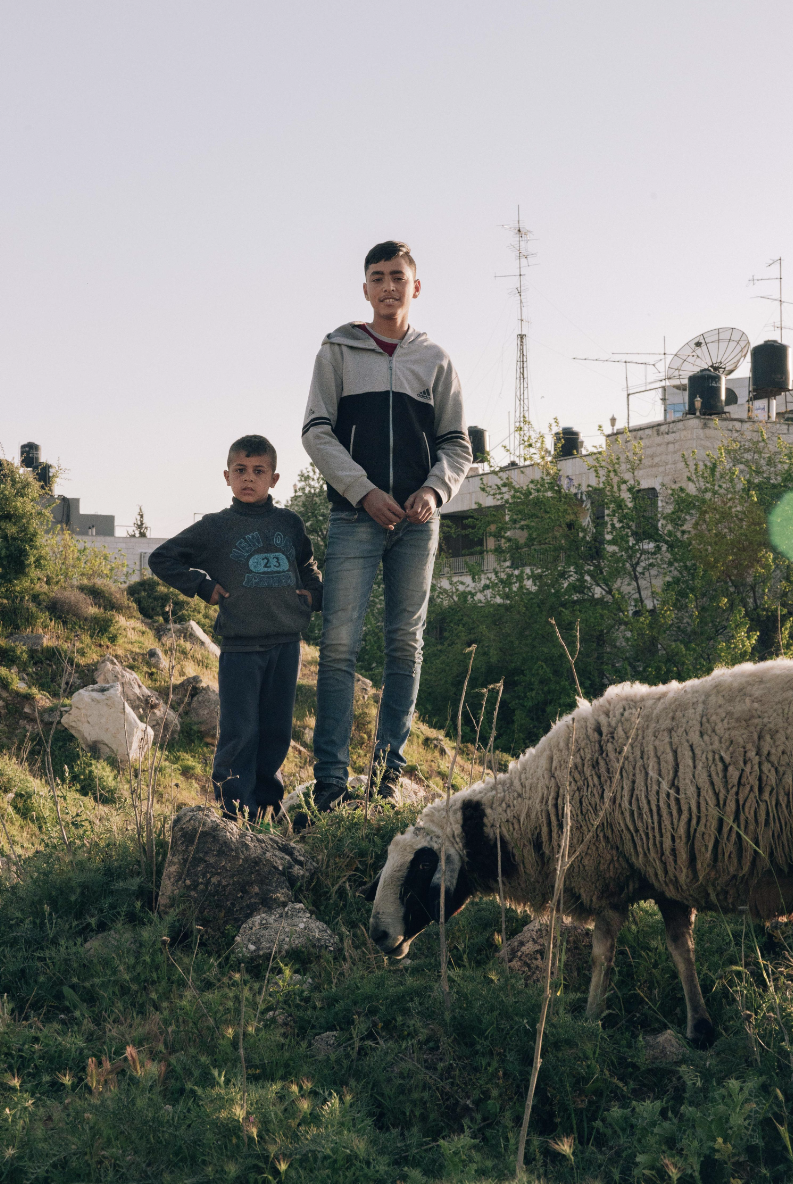
Photo by Maen Hammad
Photo by Maen Hammad
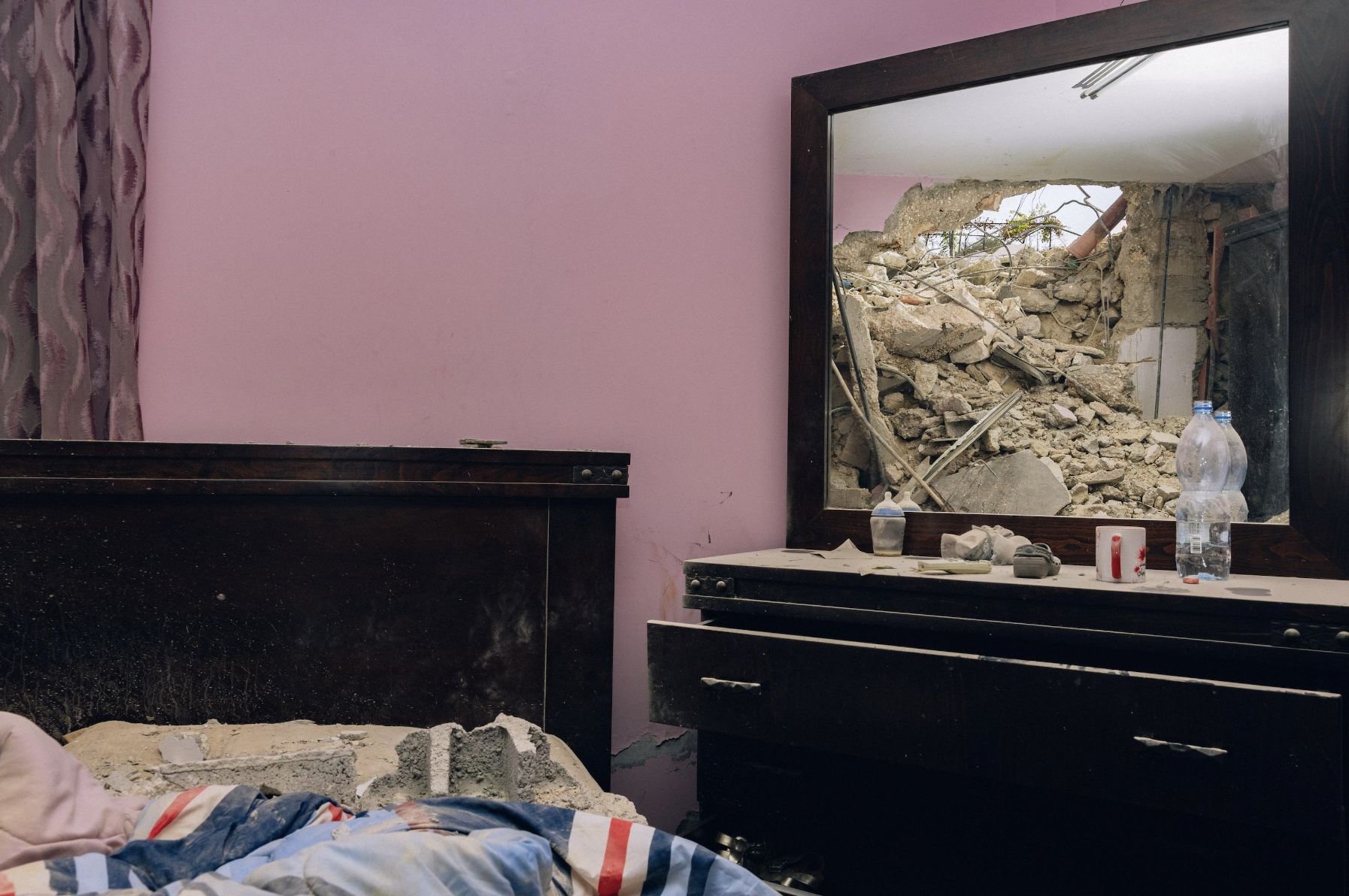
Photo by Maen Hammad
Photo by Maen Hammad
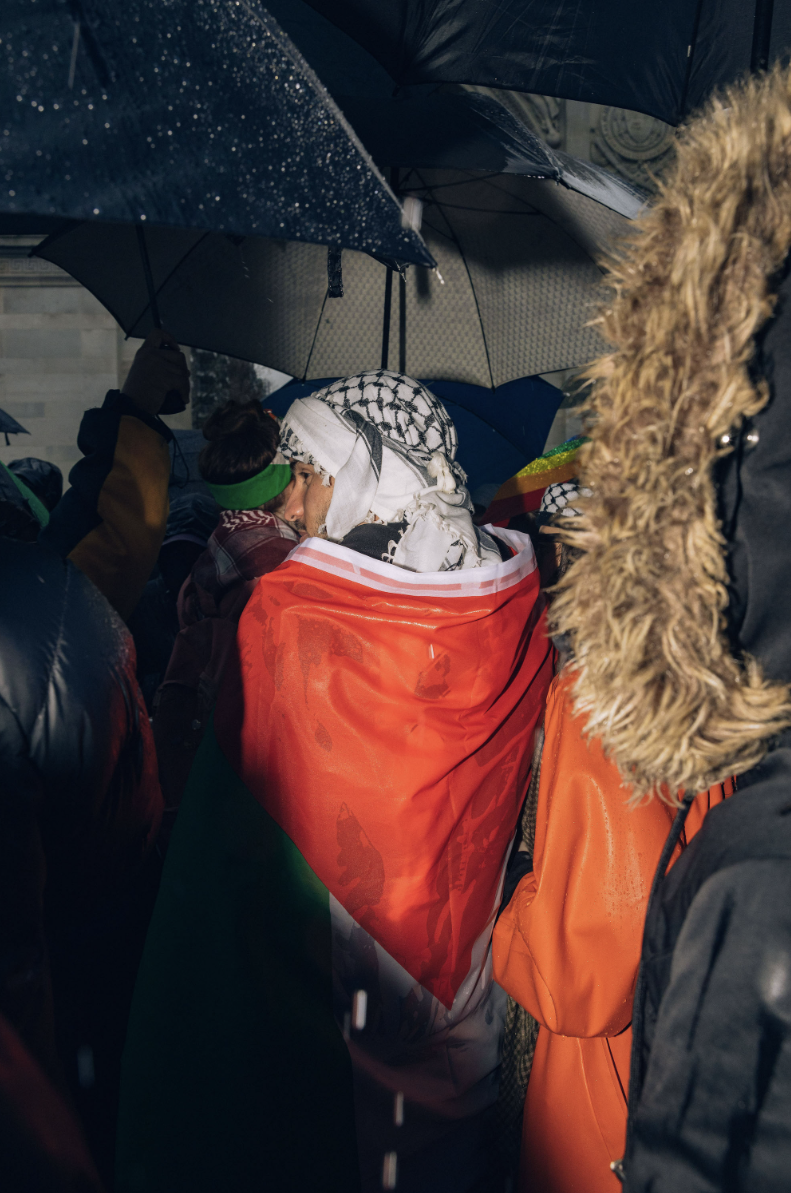
Photo by Maen Hammad
Photo by Maen Hammad
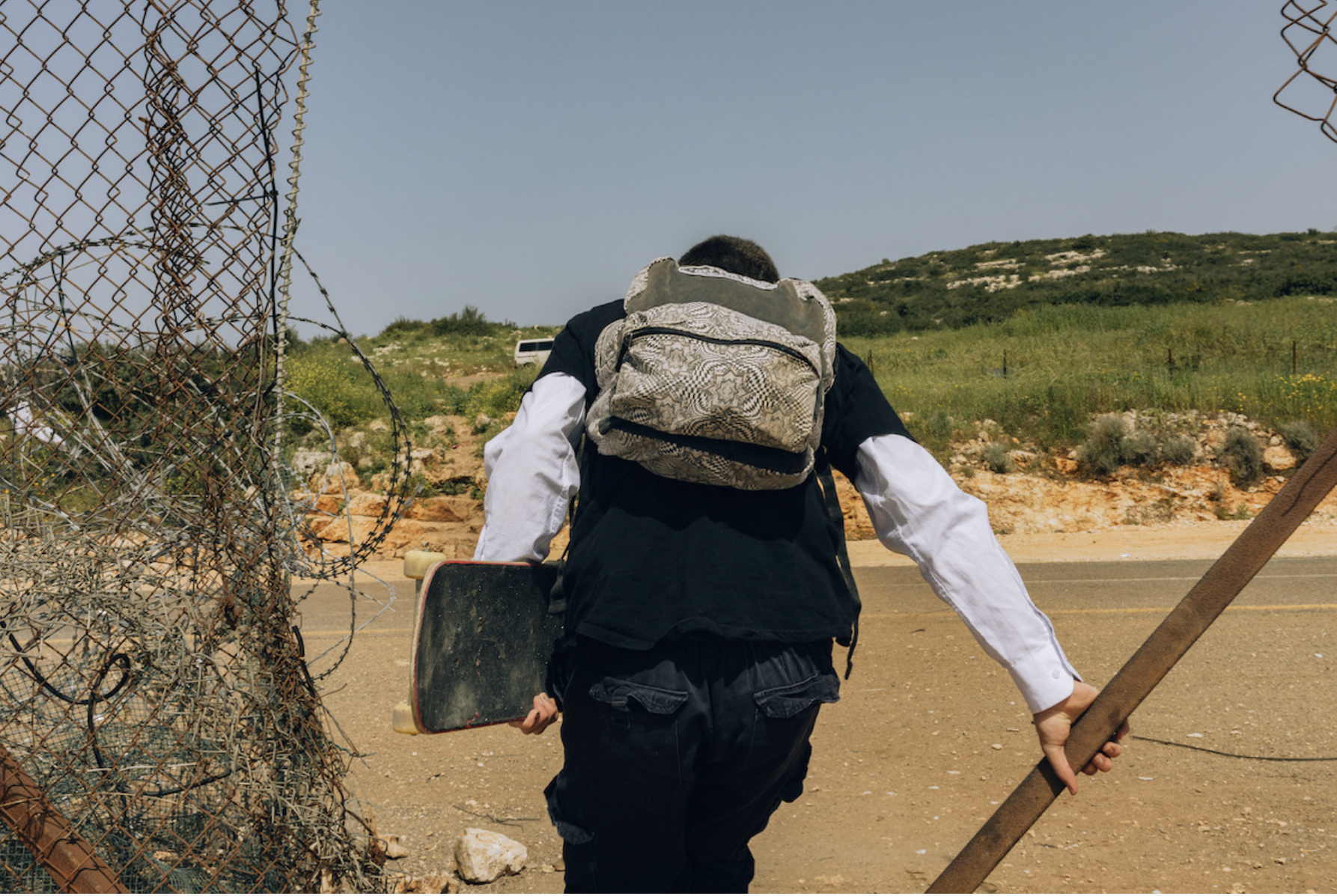
Photo by Maen Hammad
Photo by Maen Hammad
Hammad was born in Palestine but spent his childhood in the United States, often visiting his family back home where he was able to experience Israel’s regime for himself.
Those childhood trips were vital in him truly grasping what it meant to live under occupation, forming him into the activist he is today.
He believes events like the Slow Impact panel are important to his advocacy. By offering a different way of directing the conversation around Palestine, it is a vital step, however small, towards the country’s liberation.
Though the skate community in Palestine is a new and small one, that does not take away from its importance. Skating there is entirely different from doing so in a place such as America, where the worst that happens is being chased away by security. Living under a brutal occupation is what makes the recreational act a revolutionary one.
Bringing awareness to the skate community in Palestine not only lets the world know that they exist, but sheds light on the harsh truth of the occupation.
Hammad spoke about how prominent skate companies visit Israel to film and document the scene as if it is “normal”. To put into a Western perspective, it is no different than uplifting a segregated city in the Jim Crow era of the United States. It erases the suffering of Palestinians that was caused for such places to exist, and ignores the ideology of supremacy that is used to justify the apartheid regime.
Such issues and more were discussed at the Slow Impact panel, talking at length of the experience of living in Palestine, and how even being outside of the occupation still affects them. With the current genocide happening in Gaza, many find themselves unable to even skate.
The desctruction caused by the war is catastrophic, and hearing from people who are personally affected not only by the genocide in Gaza, but by the decades-long occupation allows for an understanding that goes deeper than watching the news or hearing statistics.
It is easy to feel helpless in the face of such atrocities and as Hammad says, “There’s no going back to October sixth”, but there is much that can and should be done.
Hammad has been documenting his home of the occupied West Bank for seven years with photography, whether it be the blossoming skate scene or everyday life in Palestine. His work can be found on his website.
He also encourages others to take action whether it be boycotting, protesting, or calling lawmakers. As Americans, whose tax dollars go to Israel by the billions annually, it is crucial to “not be complicit” in what is going on.
The panel also discussed ways for people to get involved. While attending events and getting educated is important, donating to Palestinian foundations and individuals who are raising funds to escape Gaza are direct ways to make change.
Being on the panel allowed Hammad to reach out to the Phoenix skate community in a way that brought awareness to sad realities, but also the hope of progress.
“I have so much respect for all of the glory that is happening in Palestine,” he says.
Though he knows there is a long journey ahead, he recognizes and appreciates all forms of resistance that are taken to move towards justice and liberation for his people.
The Dismantler: Jamilah
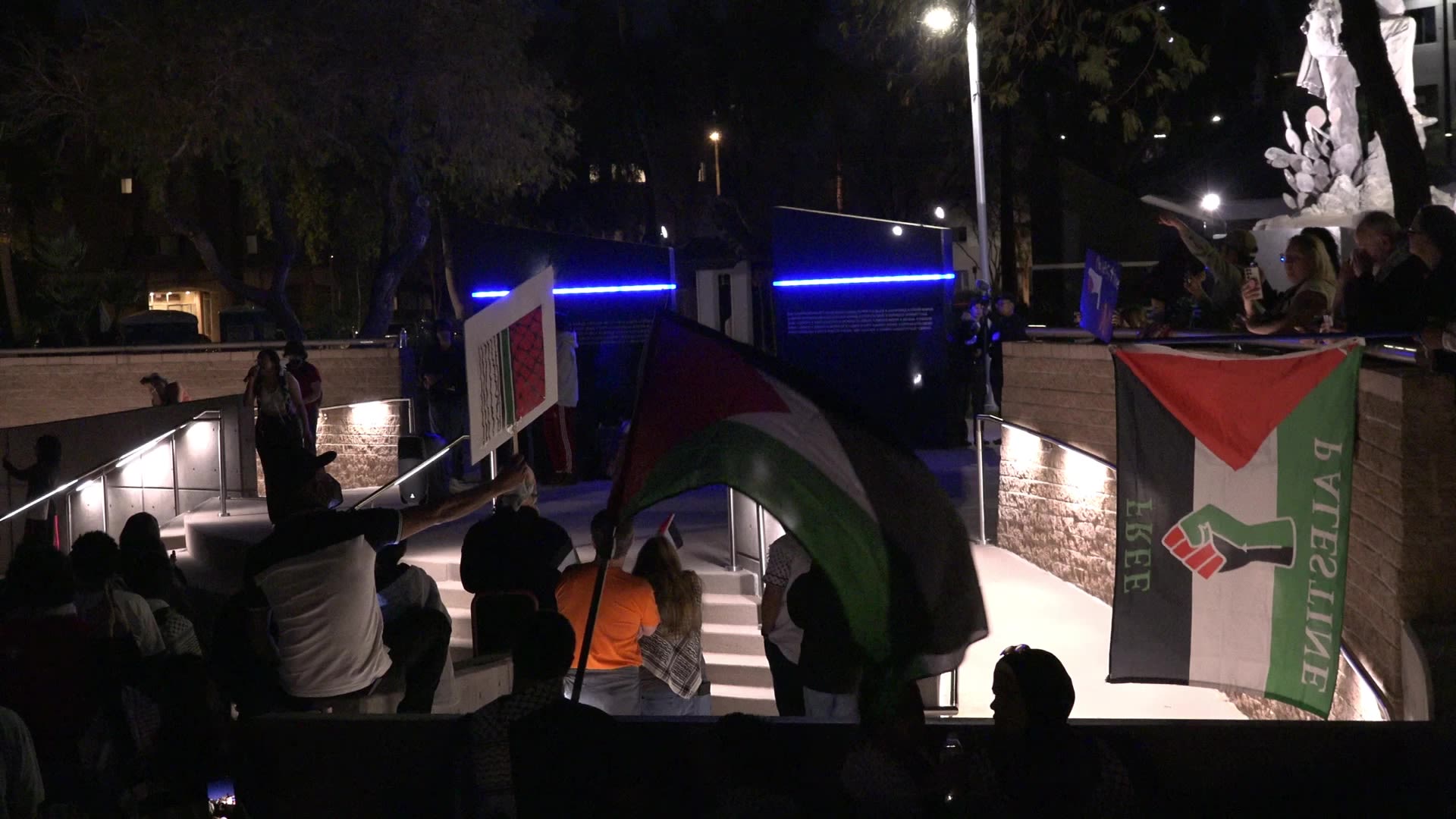
“We are facing total erasure. There is no other option than to stand tall and resist.”
Though the ongoing genocide in Gaza was the catalyst for thousands to get informed and involved, Palestine has had allies in Arizona for a long time.
Organized in 2014, the Arizona Palestine Solidarity Alliance (APSA) is a Boycott, Divest and Sanctions movement with the goal of ending all financial support from the United States that enables Israel’s occupation.
A video by Arabic news source Al Jazeera that breaks down U.S funding of Israel and how America's complacency enables the violence against Palestinians.
According to the organization’s mission statement, they will not rest until Israel “complies with International Law, respects Palestinian fundamental rights of freedom, equality and self-determination, and ends its occupation and colonization of Arab lands.”
Jamilah Abdelhaq is an APSA leader who advocates tirelessly for the liberation of her homeland. She recently took part in the “Speak On It” event at Arizona State University which highlighted several humanitarian causes.
The panel aimed to educate attendees about the situations of each crisis and provide ways to get involved. Representing APSA, Abdelhaq talked about the current war on Gaza and the occupation of Palestine as a whole.
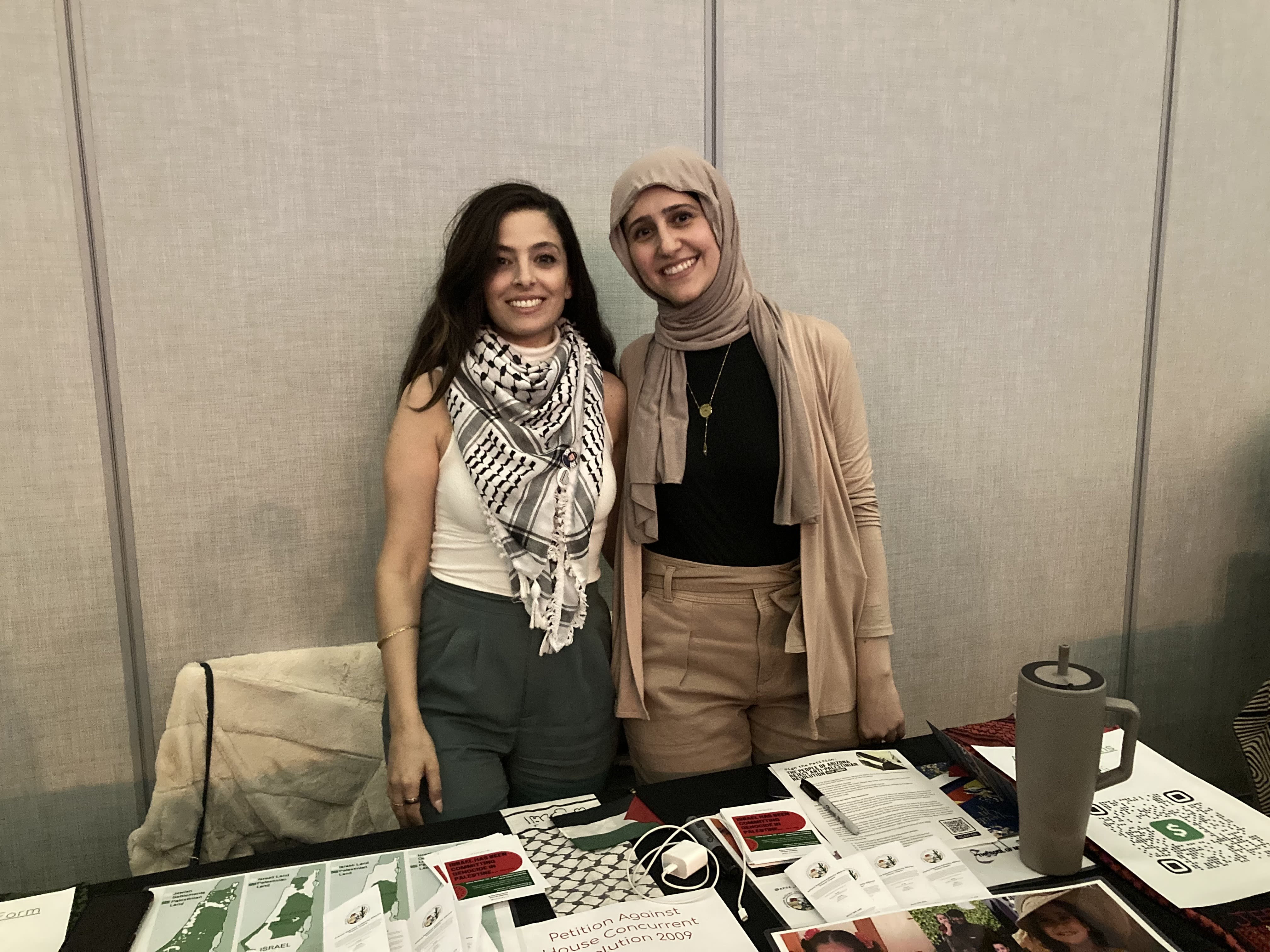
Abdelhaq (left) with fellow APSA leader at the Speak On It event
Abdelhaq (left) with fellow APSA leader at the Speak On It event
“There is a lot of work to do,” says Abdelhaq when discussing Palestinian liberation. “We still need to dismantle the apartheid regime, end the occupation, and give land back.”
Based in Tucson, APSA’s Phoenix branch aims to spread their cause which organizes events and connects with other advocation groups in the Valley.
The organization believes that all oppressions are interlinked and must be fought against together, from police brutality to the theft and destruction of Native American land that is still happening to this day.
“My work does not start and end with Palestine,” Abdelhaq says. “My work aims for the liberation and justice for all people.”
Born and raised in Palestine, Israel’s regime caused Abdelhaq to leave her home at seventeen. She describes the military occupation as “harsh” and “brutal”, and talking about her life in Palestine is difficult for her.
“Palestine should not be defined by the oppressor that is ruining it, but it is an undeniable part of life there.”
Despite the hardships she has faced, she refuses to be silenced or stop advocating. “I have drawn so much strength from my comrades, my community, and from the people of Gaza and greater Palestine. If they haven’t given up, then how could I?”
With the APSA, Abdelhaq hopes to end the occupation of Palestine, stop the genocide in Gaza, and continue advocating for the countless other humanitarian causes that plague the world today. She also encourages others to get involved.
“Show up for your community and stand for something!” she says. “Getting the education then taking to the streets to show your support is a wholesome approach to doing the work.”
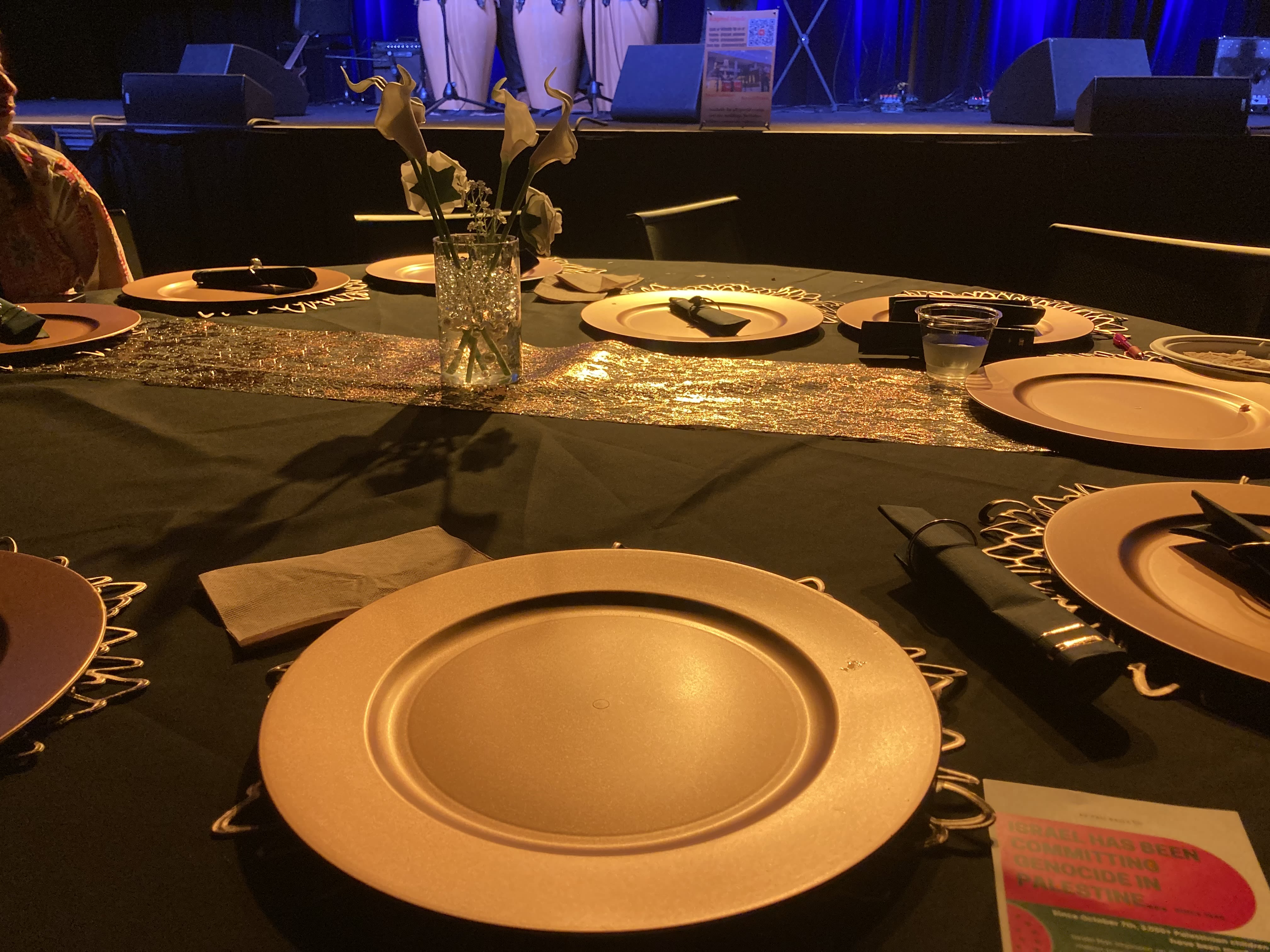
Speak On It's venue, and a flyer handed out by APSA
Speak On It's venue, and a flyer handed out by APSA
Abdelhaq is proud of those who have stepped up to advocate, but it is the source of bitter-sweet emotions for her. “While it has been great to see how many people have mobilized for Palestine, and I have immense gratitude for that, I also wonder why it had to take 30,000 of my people being slaughtered for anyone to pay attention.”
She has nothing to say for those who refuse to stand up and take a side, crediting Western society as the reason for such apathy.
“Today’s society glorifies materialism, consumerism, celebrity, and individuality. That makes it easy for people to be consumed with themselves and not view themselves as a larger part of a community of humans.”
When people stand together for causes, they can make a difference, and that is what APSA is all about; to unite with different struggles and liberate them all. Abdelhaq’s philosophy perfectly encapsulates this.
“Keep asking the questions. Keep an open mind. Keep learning, don’t stop talking about justice for all people in the world.”
To learn more about the Arizona Palestine Solidarity Alliance and get involved, visit here.
The Artists:
Ariyana & Em
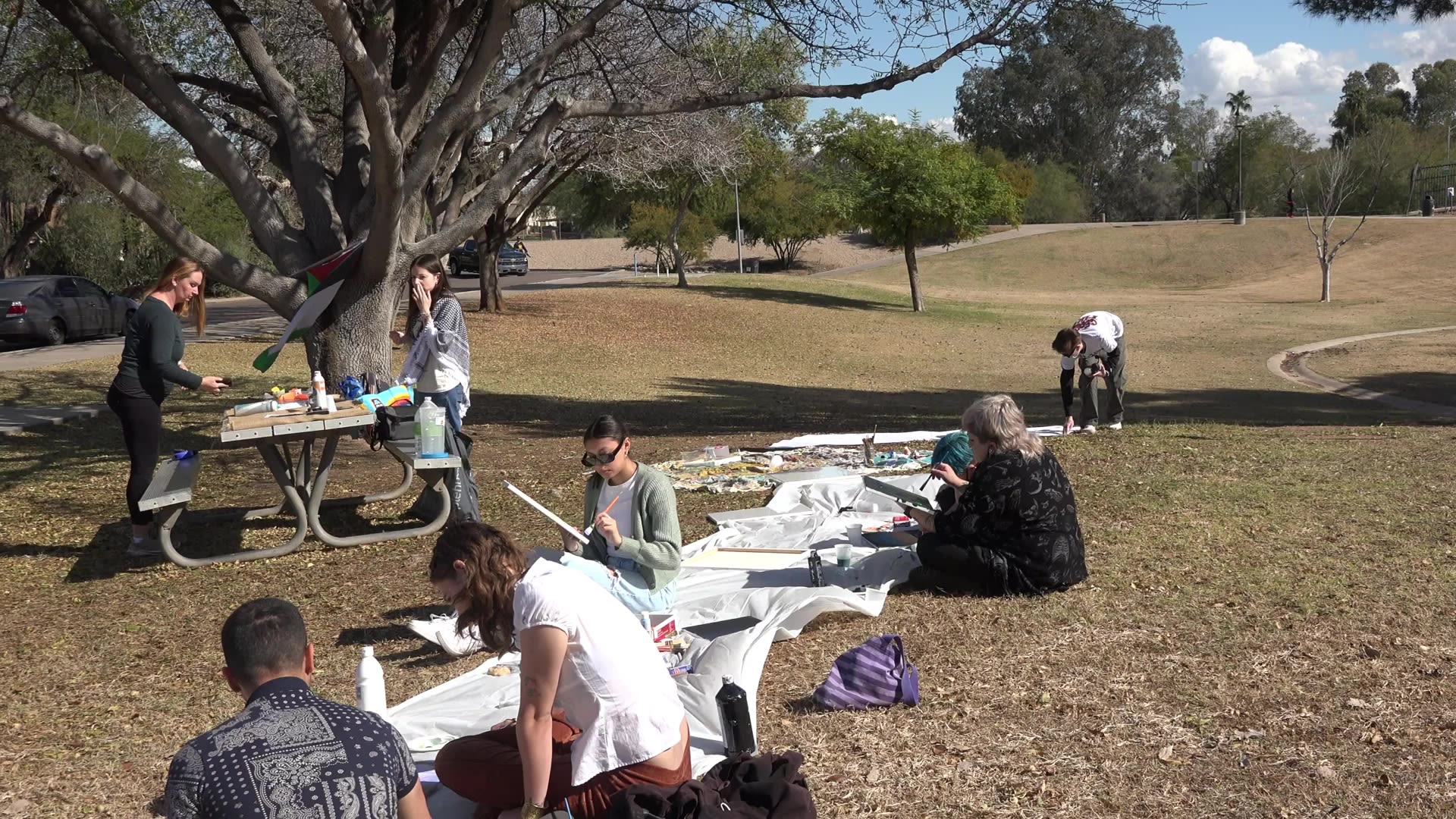
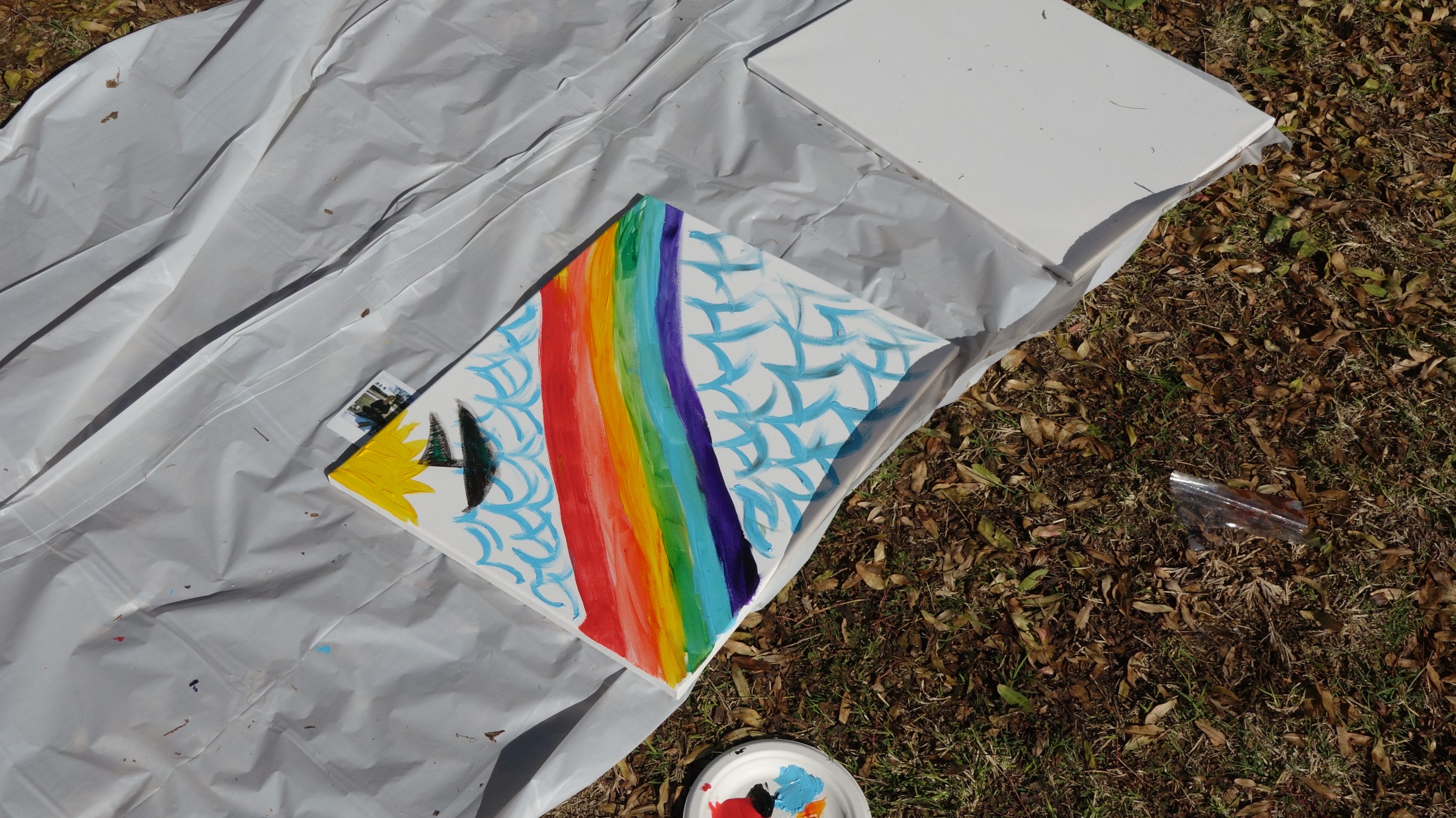
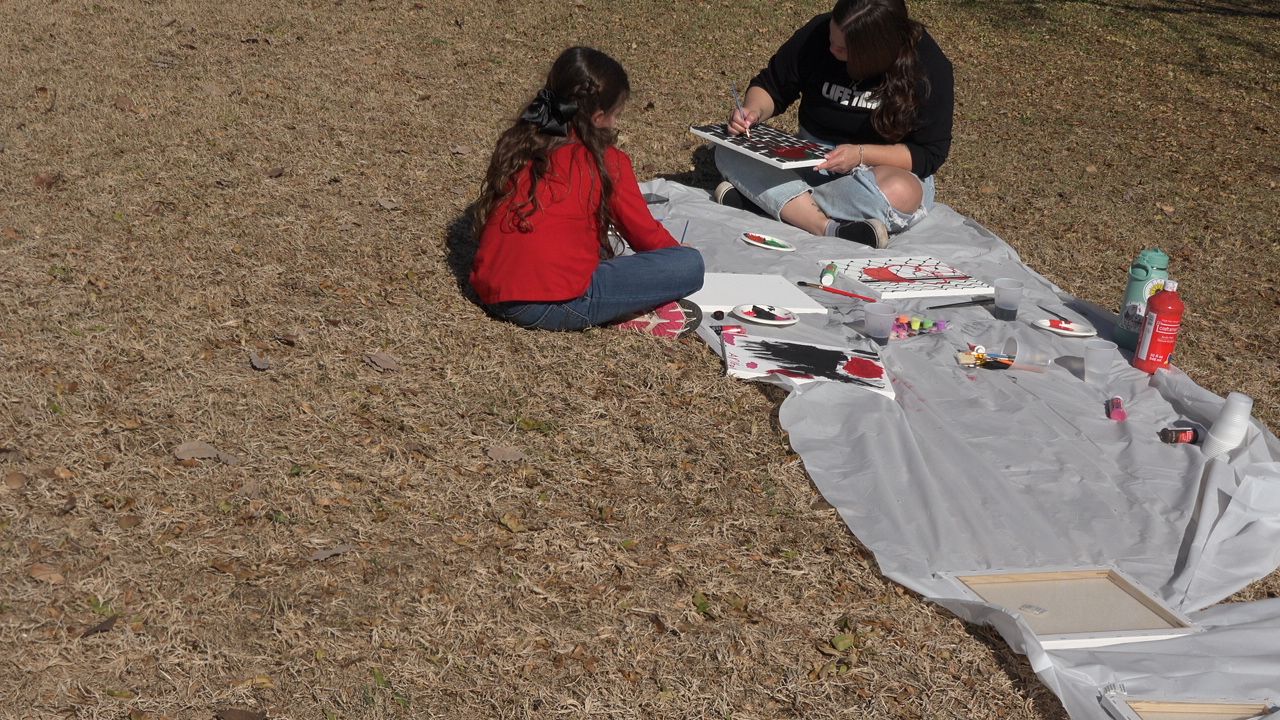
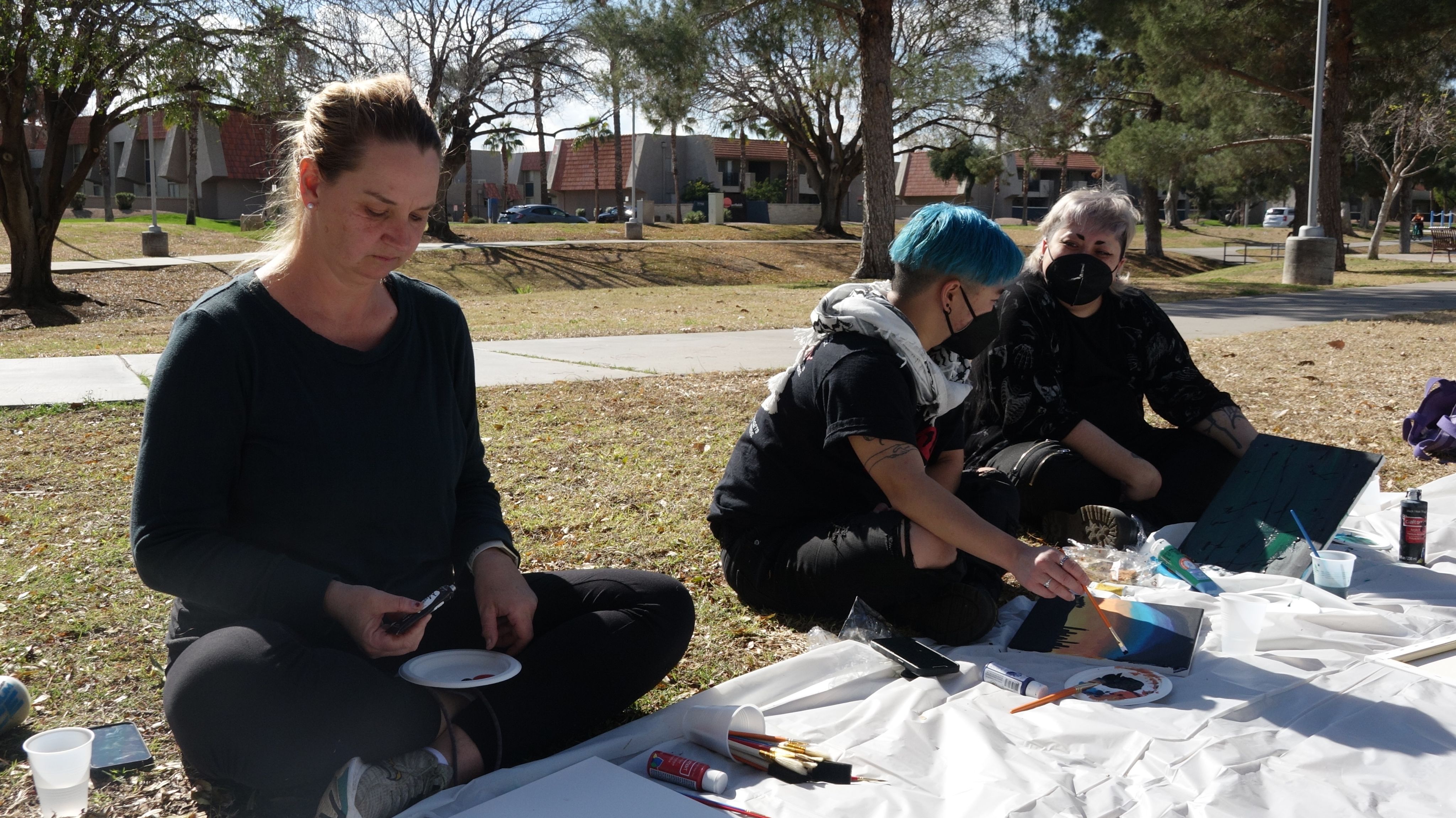
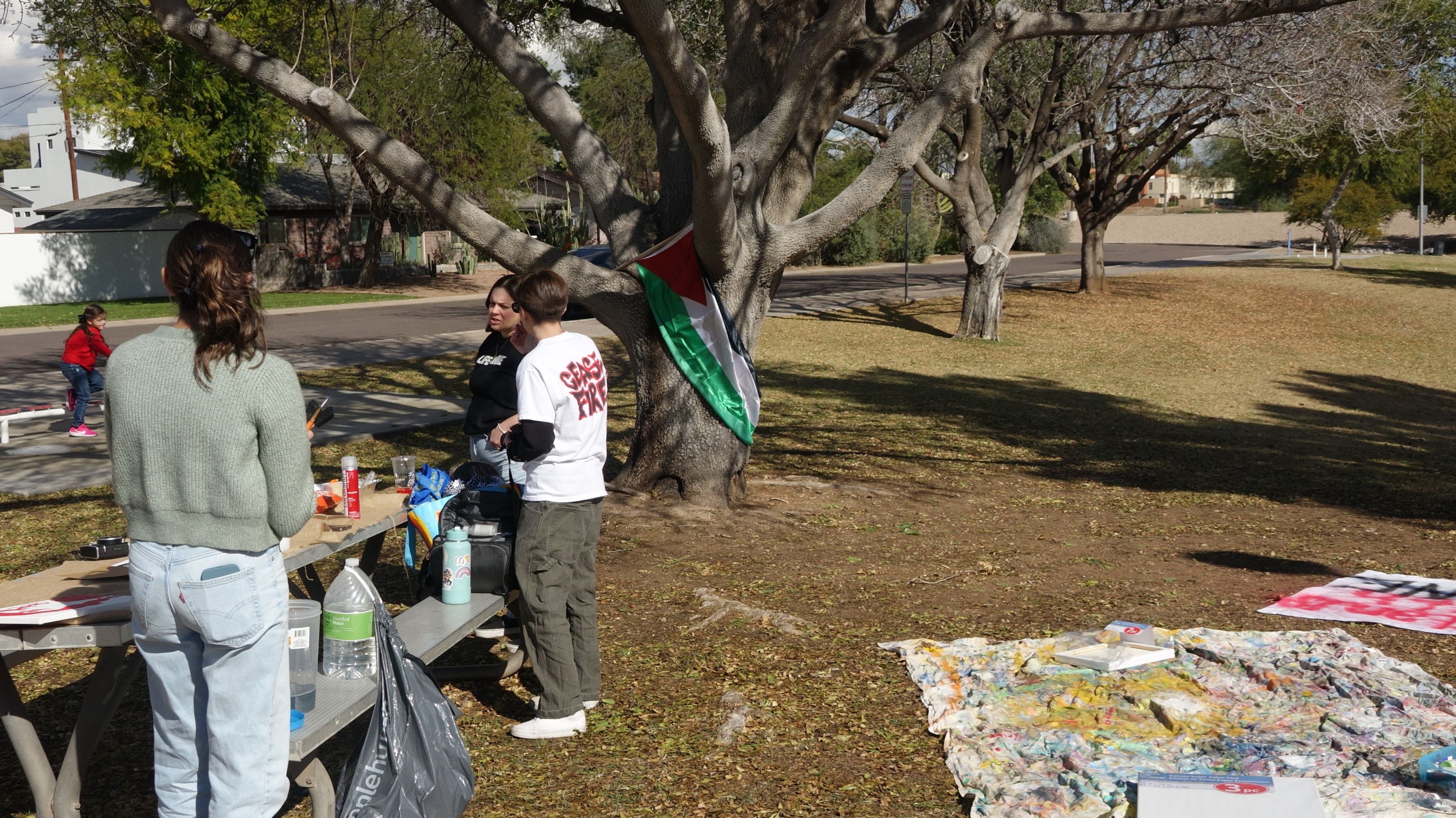
Hornack with a Paint for Palestine attendee
Hornack with a Paint for Palestine attendee
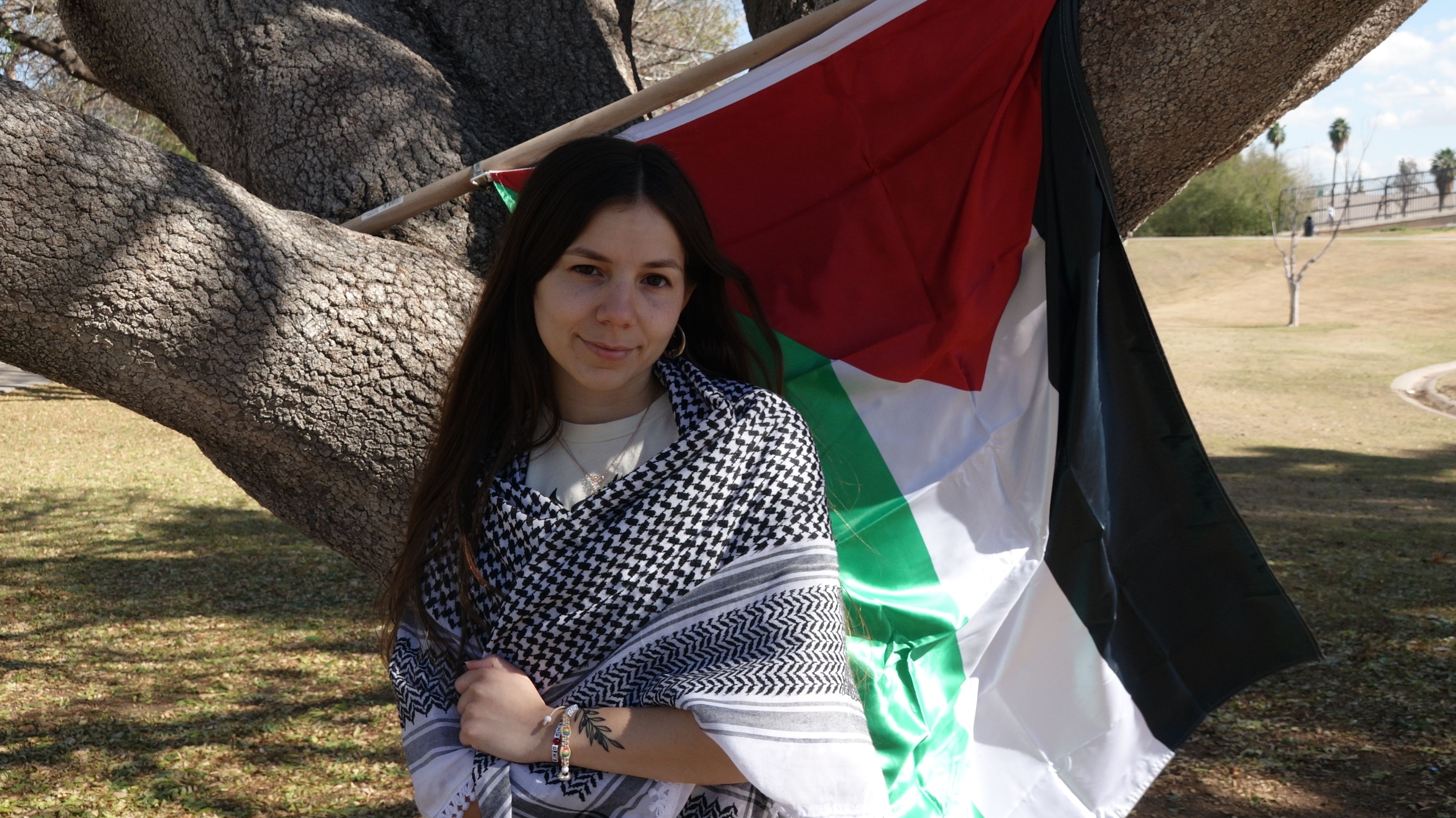
Cruz at the Paint for Palestine event
Cruz at the Paint for Palestine event
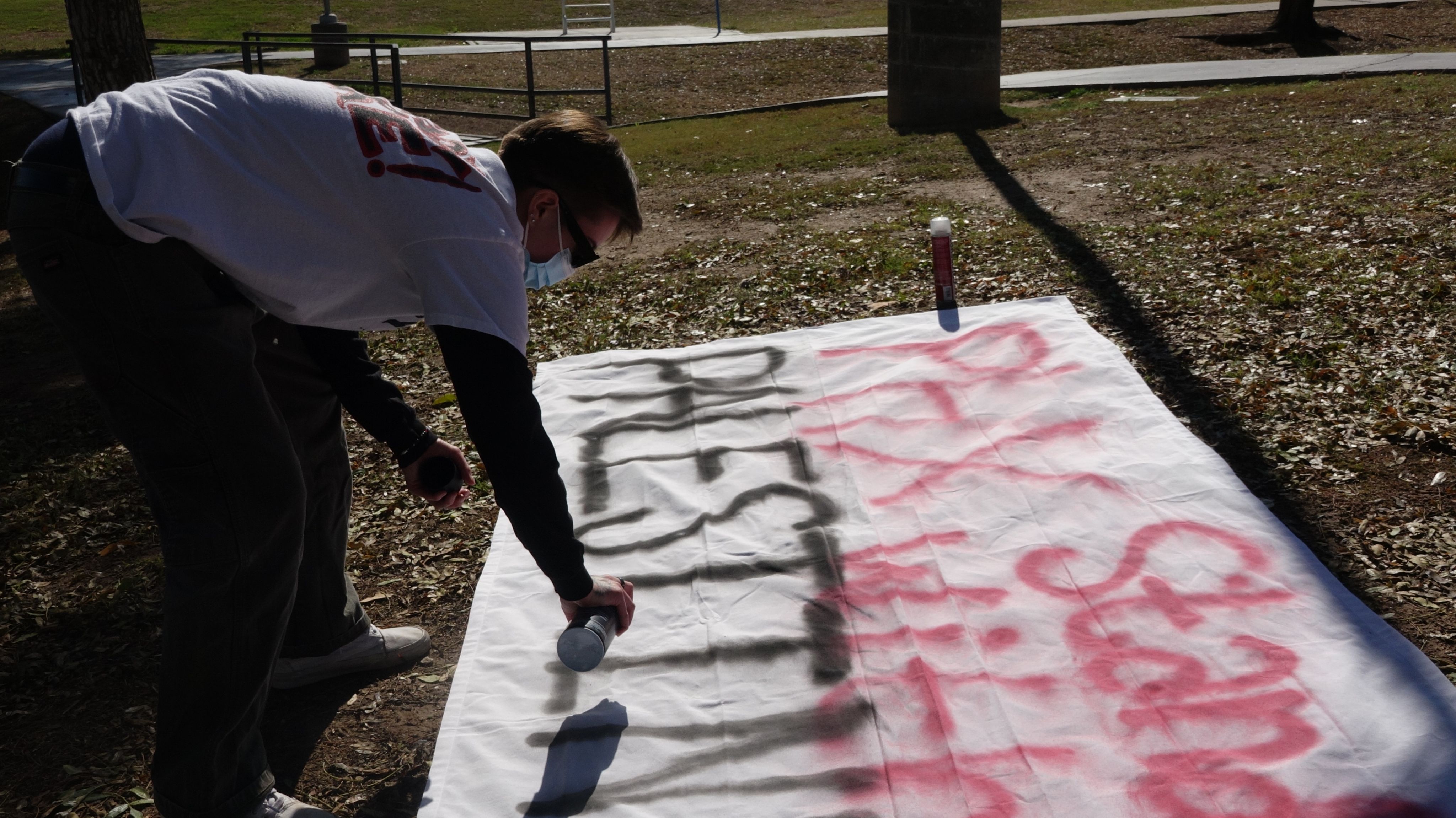
Hornack at the Paint for Palestine Event
Hornack at the Paint for Palestine Event
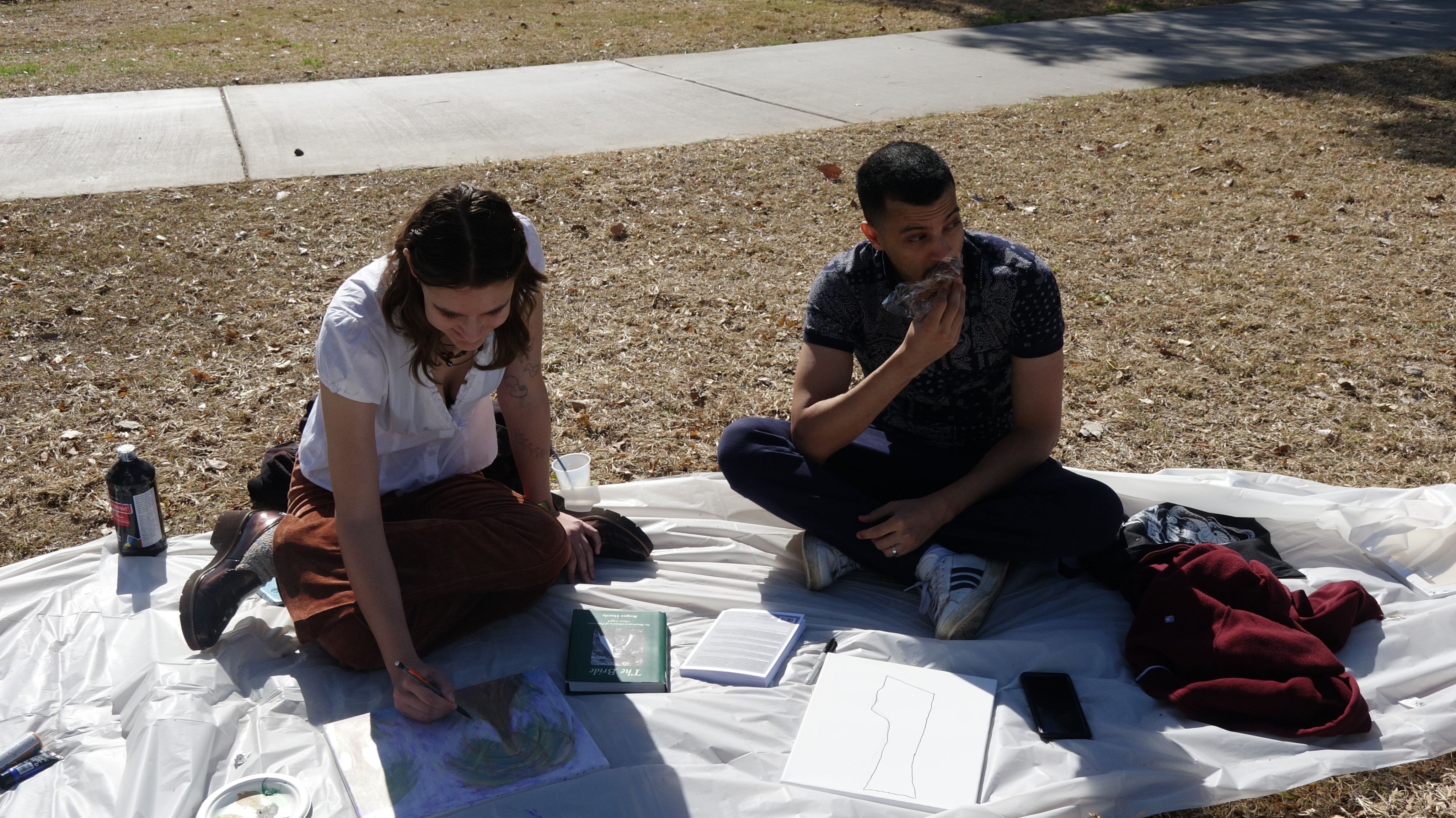
Attendees of the Paint for Palestine event
Attendees of the Paint for Palestine event
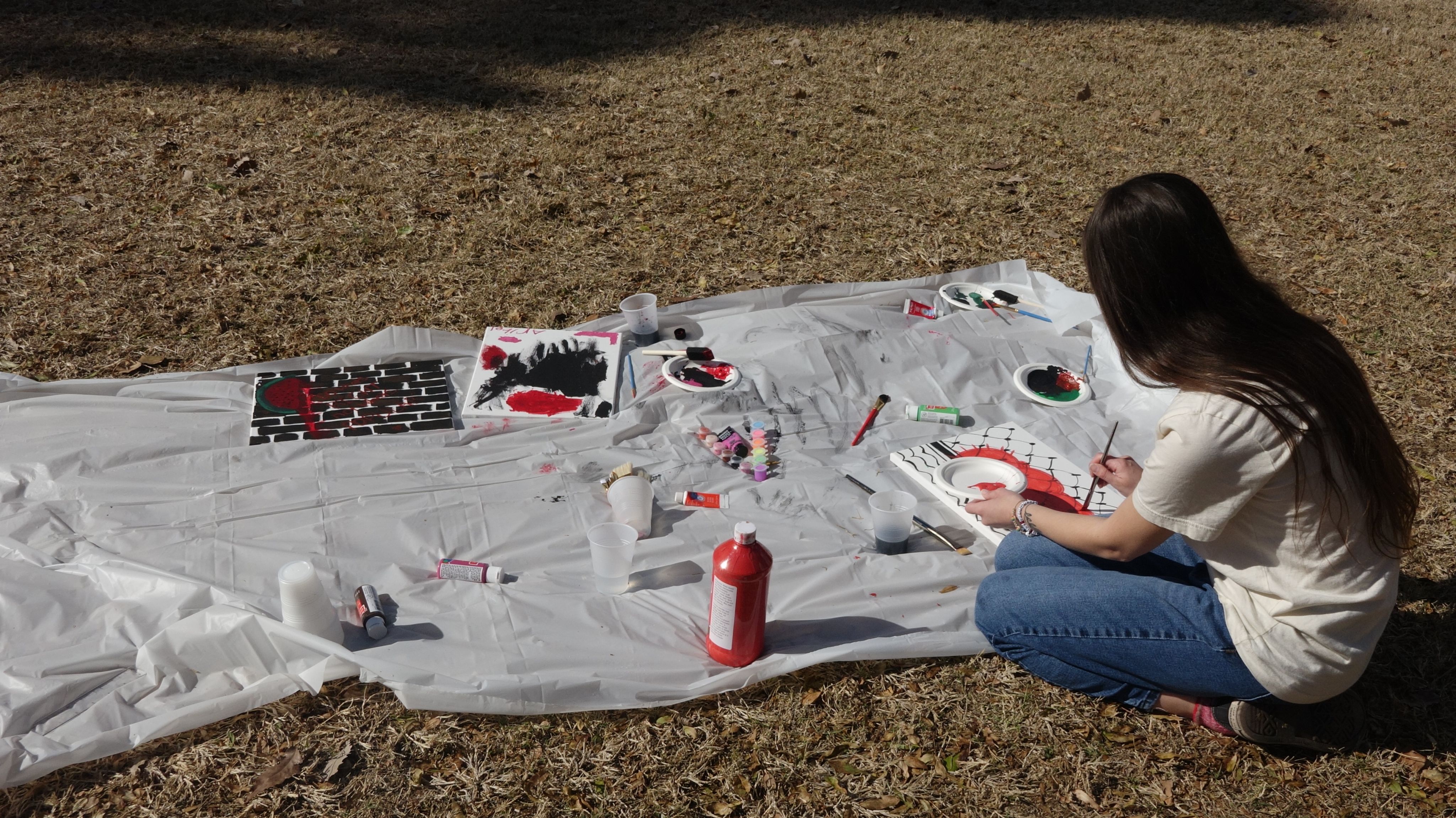
Cruz painting a sign
Cruz painting a sign
Not everyone joined the fight so early.
On a bright Saturday morning with clouds in the distance, a Palestinian flag waves gently in the cool breeze. The forecast predicted all-day rain, but it seems the sun decided to shine down upon this small park in Scottsdale.
Scattered across a tarp lay an array of art supplies waiting to be used. The only fee is a donation to the Palestinian Children’s Relief Fund (PCRF), an organization that has been working for decades to provide health care in Palestine.
The Paint for Palestine event took place in early February, encouraging people to find community and show support. As passionate as they are, the couple that hosted it only learned about what was happening across the sea a mere four months earlier.
Both Airyana Cruz and Em Hornack were informed about the war on Gaza through social media, having little to no prior knowledge about the struggle in Palestine.
“I didn’t know anything about Palestine, I didn’t even know the word Palestine,” Hornack says. “I knew absolutely nothing.”
After hearing about the war on Gaza, the couple began educating themselves on social media, following Palestinian journalists before finding news sources, books and documentaries. They learned not only about what is currently happening, but the long, bloody history of the occupation, which encouraged them to start attending protests.
Getting more deeply involved with the cause was one of the reasons they decided to host their own event.
At Paint for Palestine, they hung a Palestinian flag where attendees could easily spot it and warmly greeted everyone who came out. After donating to the PCRF, supporters were given a canvas and free reign to paint whatever they pleased.
Attendees chatted easily, making new friends and talking about what was happening in Palestine as they painted flowers, landscapes or signs for the next protest.
With the horrific war on Gaza and decades long occupation, it is easy to feel hopeless, especially from 1,000 miles away. Combating fatigue was another contributing factor for hosting Paint for Palestine.
The couple has befriended many people in the cause who they stand in solidarity with, but there has been plenty of backlash for their stance.
Much of it has been at protests or online through social media platforms. Zionists send hateful messages, questioning their stance and insulting them.
Cruz isn’t bothered by them. “Those are, to me, uneducated people trying to start something.”
She believes people who attack her stance or believe the issue is too complicated to take a side “don’t know enough” and must educate themselves on the history of the conflict.
The negative responses haven’t been completely contained to the internet, however. Both have lost friends because of the conflict, and Hornack has cut contact with several family members.
Hornack cancelled a flight to their uncle months ago due to the airline’s ties to Israel. When explaining the reasoning, they received a storm of messages from their uncle, a Zionist who stands firmly with Israel, as well as backlash from other family members.
While they don’t enjoy losing friends and family, it is not something they will go back on.
“It is not an option in my head,” Hornack says. “My support is just part of me.”
Cruz feels the same as her partner. She understands that her loss of friends is nothing compared to what those in Palestine face daily and she draws strength from them, especially those that are in the heart of the war.
“Their passion for Palestinian freedom has not dulled. Seeing Bisan still trying to find reasons to smile and make the kids around her smile pushes me every day to want to do as much as I can.”
Bisan Odwa, a journalist currently trapped in Gaza, is only one of many content creators the couple follows. They encourage others looking to stay informed to find Palestinian voices to listen to and uplift.
While the couple is glad they are now aware of injustices happening around the world, it is still a heavy thing to know. Both Cruz and Hornack want the people around them to understand that they act out of love, and that they will keep advocating not only for Palestine, but all oppressed groups of the world that deserve justice.
Whether this struggle is one they were born into or a cause they recently joined, the people in Phoenix have been showing up for Palestine.
Countless advocate daily for the land 1,000 miles away that has been fighting for more than 75 years. From hosting community events, divesting funders of Israel or simply taking a ride on a skateboard, every act of resistance goes towards the fight for Palestine’s freedom, no matter how far.
To contact her or see more of Sielle Neal's work, visit here.
